A pond transforms any ordinary backyard into a peaceful sanctuary where nature and design come together in perfect harmony. These aquatic features offer more than just visual appeal—they create a soothing atmosphere through the gentle sounds of water movement and provide a home for wildlife. Whether you dream of watching colorful koi glide through crystal-clear water or want to attract birds and butterflies to your garden, pond landscaping opens up endless possibilities for outdoor relaxation. From sleek modern designs that complement contemporary homes to traditional natural ponds that blend seamlessly with existing landscapes, there's a perfect pond style for every space and budget. The key lies in choosing elements that work together to create a cohesive theme. Each design approach offers unique benefits, from low-maintenance container gardens perfect for small patios to elaborate multi-level water features that become the centerpiece of large yards. These ideas will help you create your own tranquil retreat.
1. Natural Stone Waterfall Pond Design
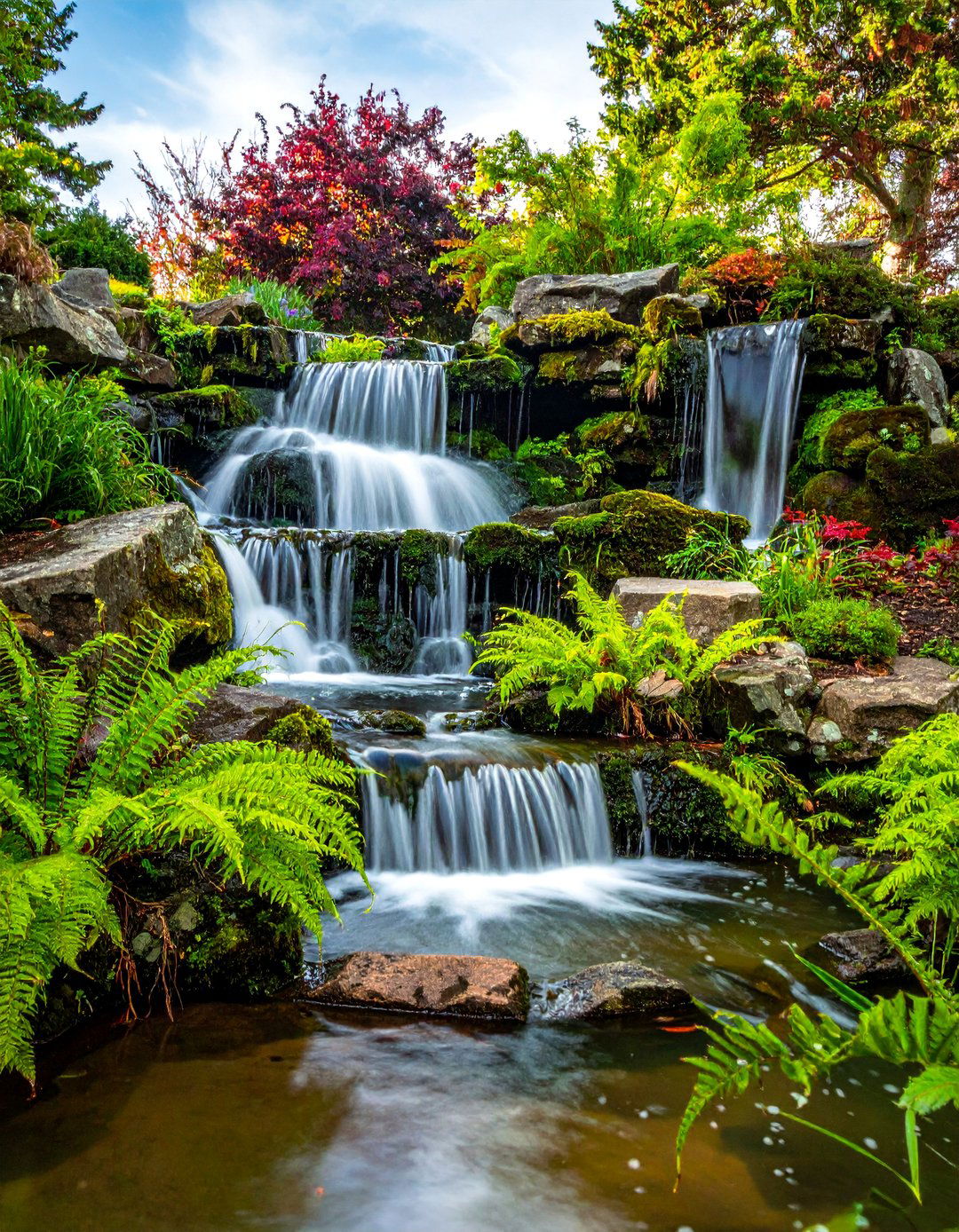
Transform your backyard into a mountain retreat with cascading water flowing over carefully arranged natural stones. This design mimics nature's own water features by using large boulders and smaller rocks to create multiple tiers where water tumbles from level to level. The irregular shapes and earthy tones of natural stone blend seamlessly with surrounding plants, making the feature appear as though it has always been part of the landscape. Position larger stones as focal points while filling gaps with medium and small rocks to guide water flow naturally. What makes this design truly captivating is how the sound changes as water hits different stone surfaces, creating a symphony of gentle splashes and flowing streams. Surround the pond with native plants like ferns, hostas, and ornamental grasses to complete the wilderness aesthetic. This style works especially well on sloped terrain where gravity naturally assists water movement.
2. Modern Geometric Koi Pond
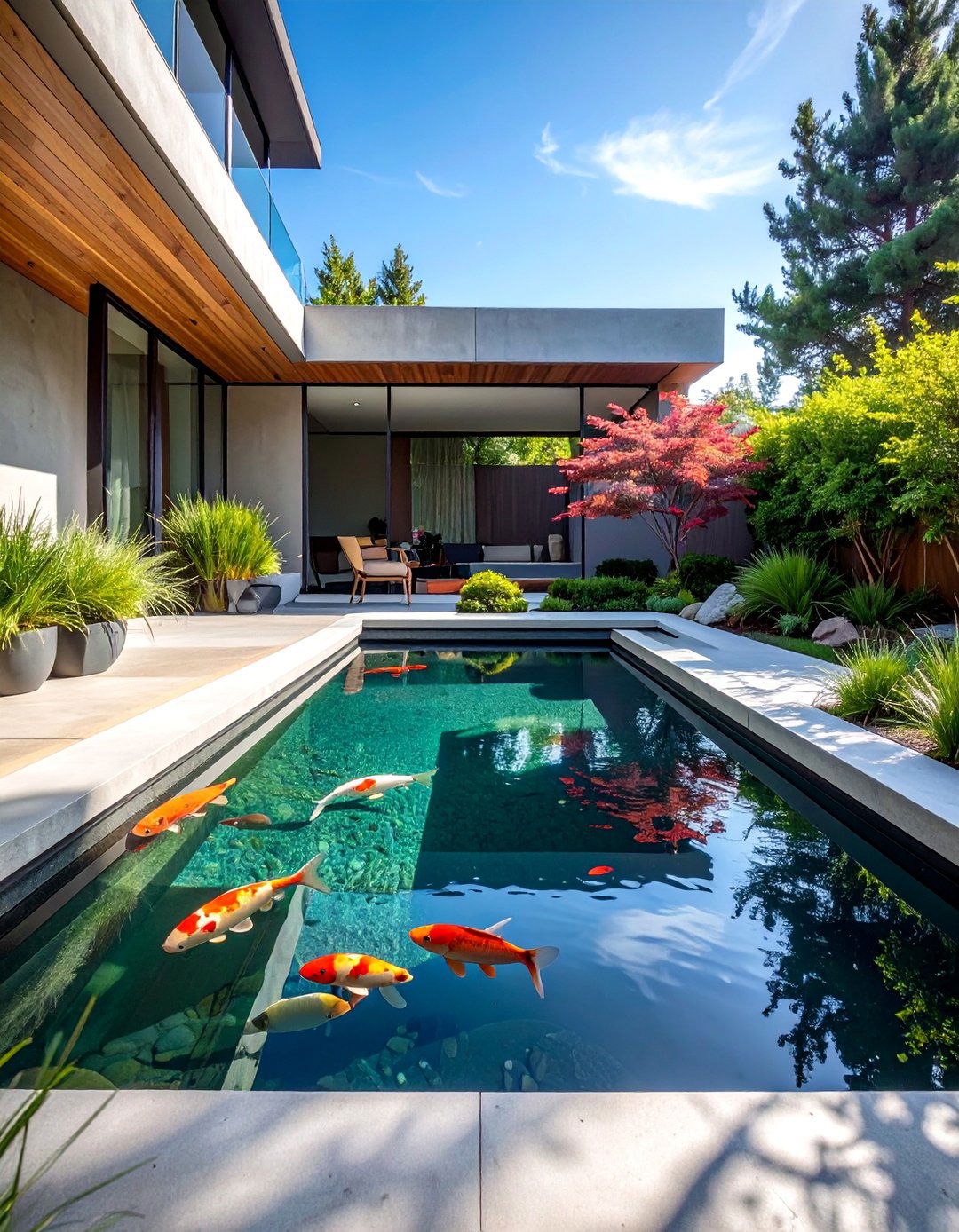
Contemporary homes deserve water features that reflect their clean architectural lines and sophisticated style. A geometric koi pond uses rectangular, square, or circular shapes with crisp edges and smooth materials like concrete, steel, or composite decking. The minimalist approach focuses attention on the water itself and the graceful movement of colorful koi fish swimming in precise patterns. How stunning would it be to watch these living jewels glide through crystal-clear water framed by sleek modern materials? Incorporate built-in seating along the edges for comfortable fish watching, and consider underwater lighting to create dramatic evening displays. The surrounding landscape should echo the pond's clean lines with structured plantings in geometric planters or linear garden beds. Materials like brushed steel, glass panels, or smooth concrete create perfect contrast against the organic movement of fish and water. This design proves that modern aesthetics and natural elements can work together beautifully.
3. Japanese Zen Garden Pond
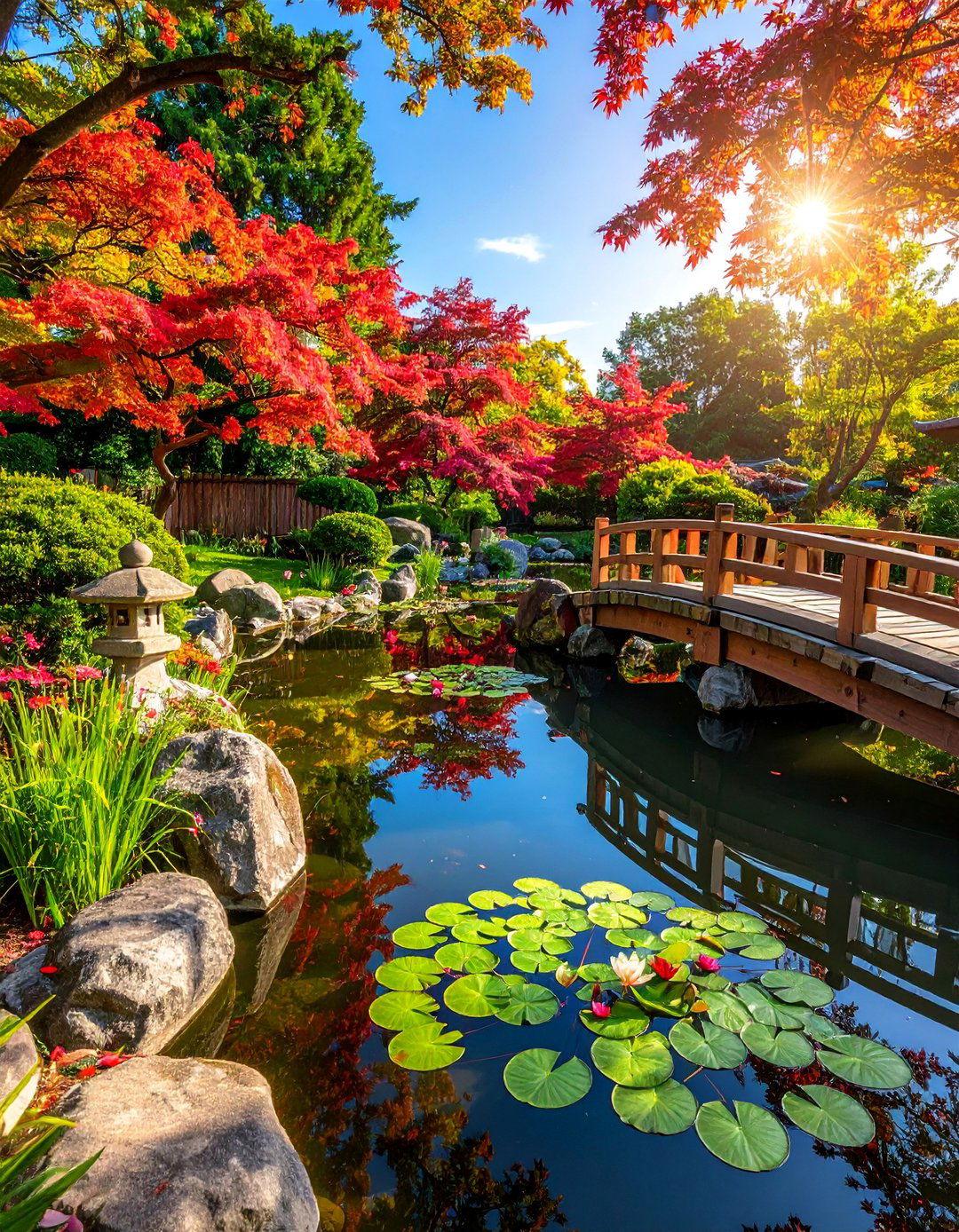
Create a space for meditation and reflection with a traditional Japanese-inspired pond design that emphasizes simplicity and balance. This style features carefully placed stones, a wooden bridge, and minimal plantings to encourage contemplation and inner peace. The pond itself often has irregular, natural curves that represent the flow of life, while stone lanterns and carefully pruned plants add authentic touches. Can you imagine starting each morning with quiet reflection beside gently rippling water? The key elements include a simple wooden or stone bridge spanning the water, strategically placed rocks that appear naturally weathered, and plants like Japanese maples, bamboo, and moss. Water lilies float serenely on the surface, while the absence of bright colors keeps the focus on peaceful simplicity. The overall effect creates a sacred space where busy minds can find stillness and clarity. This design works particularly well in enclosed courtyards or quiet corners of larger gardens.
4. Container Water Garden Oasis
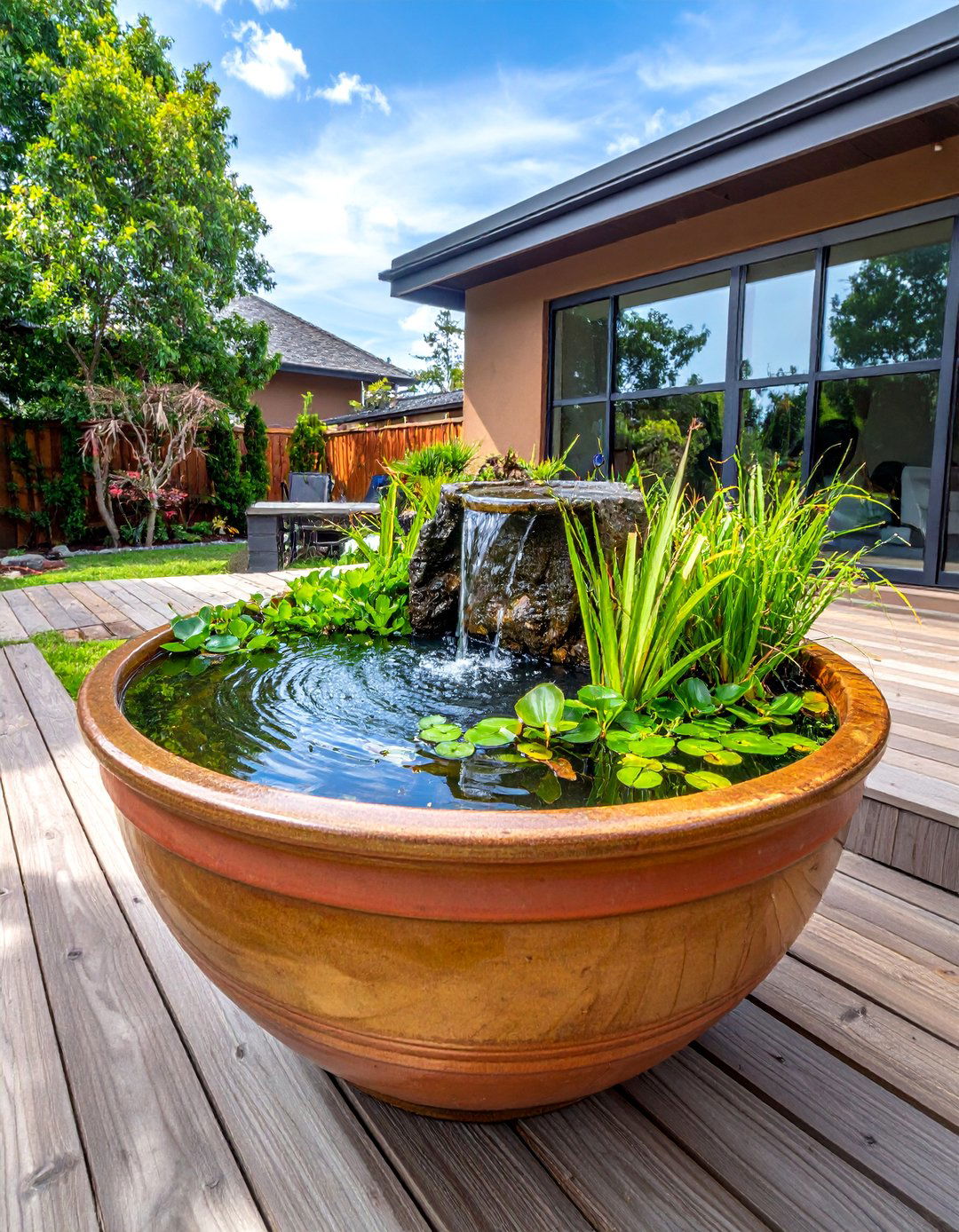
Small spaces need not limit your pond dreams when container gardens offer all the beauty of larger water features in compact, portable packages. Large ceramic pots, whiskey barrels, or purpose-built containers become miniature aquatic ecosystems perfect for patios, decks, or apartment balconies. These self-contained gardens can house small fountains, aquatic plants, and even tiny fish while requiring minimal maintenance and space. What could be more delightful than having your own water garden just steps from your kitchen door? Choose containers at least 20 inches wide and deep enough to prevent freezing in winter climates. Layer different heights of plants from tall water irises to floating water hyacinths, creating visual depth despite the compact size. Add a small bubbler or fountain pump to keep water moving and prevent mosquito breeding. These flexible gardens can be rearranged seasonally, moved to follow sunlight, or even brought indoors during harsh weather.
5. Wildlife Habitat Pond Design
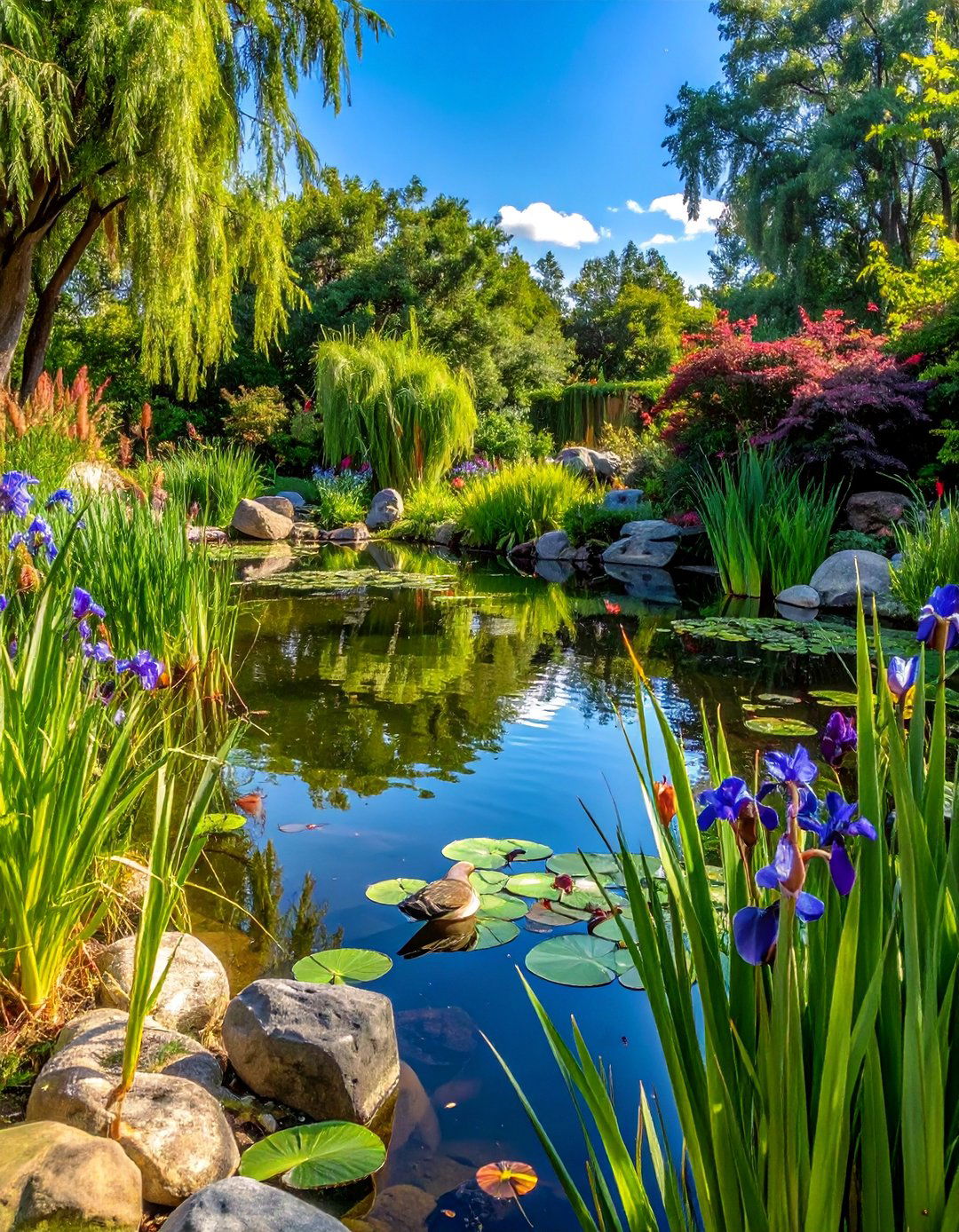
Design your pond as a thriving ecosystem that welcomes birds, butterflies, frogs, and beneficial insects while creating a dynamic, ever-changing landscape. This approach emphasizes native plants, varied water depths, and natural materials that provide food, shelter, and nesting opportunities for local wildlife. Shallow areas allow birds to bathe and drink safely, while deeper sections support fish and aquatic plants. Have you considered how amazing it would be to watch nature's daily drama unfold right outside your window? Include marginal plants like cattails and water irises around the edges, submerged plants for oxygen production, and floating plants for fish protection. Create hiding spots with hollow logs, rock piles, and dense plantings where creatures can find shelter. Avoid chemicals and pesticides that might harm visiting wildlife, instead relying on natural biological balance to maintain water quality. The reward is a constantly changing tableau of nature that provides entertainment and education for the whole family.
6. Raised Stone Pond Feature
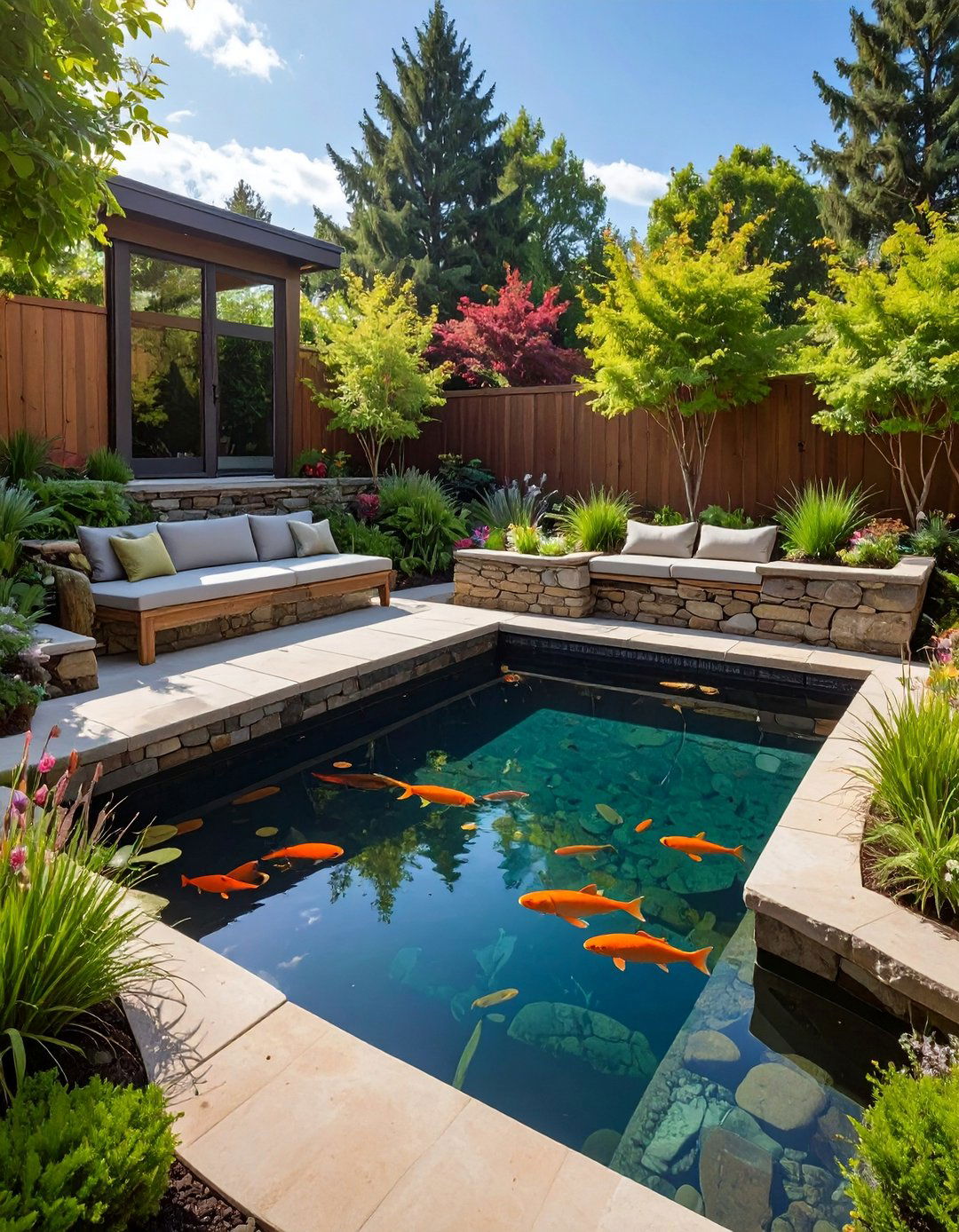
Elevate your water feature both literally and aesthetically with a raised pond built from stacked stone, brick, or concrete blocks. This approach creates a dramatic focal point while making pond maintenance easier and providing built-in seating around the perimeter. The raised design also offers better viewing angles for watching fish and reduces the risk of accidents around the water. Why not create a gathering spot where family and friends can sit comfortably while enjoying the peaceful sounds of water? Choose materials that complement your home's architecture, from rustic fieldstone for cottage-style gardens to sleek concrete blocks for modern landscapes. The raised walls can incorporate planters for trailing plants or water features like small spillways. This design works particularly well on flat terrain where a traditional in-ground pond might lack visual impact. Add comfortable cushions to the wall caps for extended relaxation sessions beside your personal oasis.
7. Multi-Level Cascade Pond System
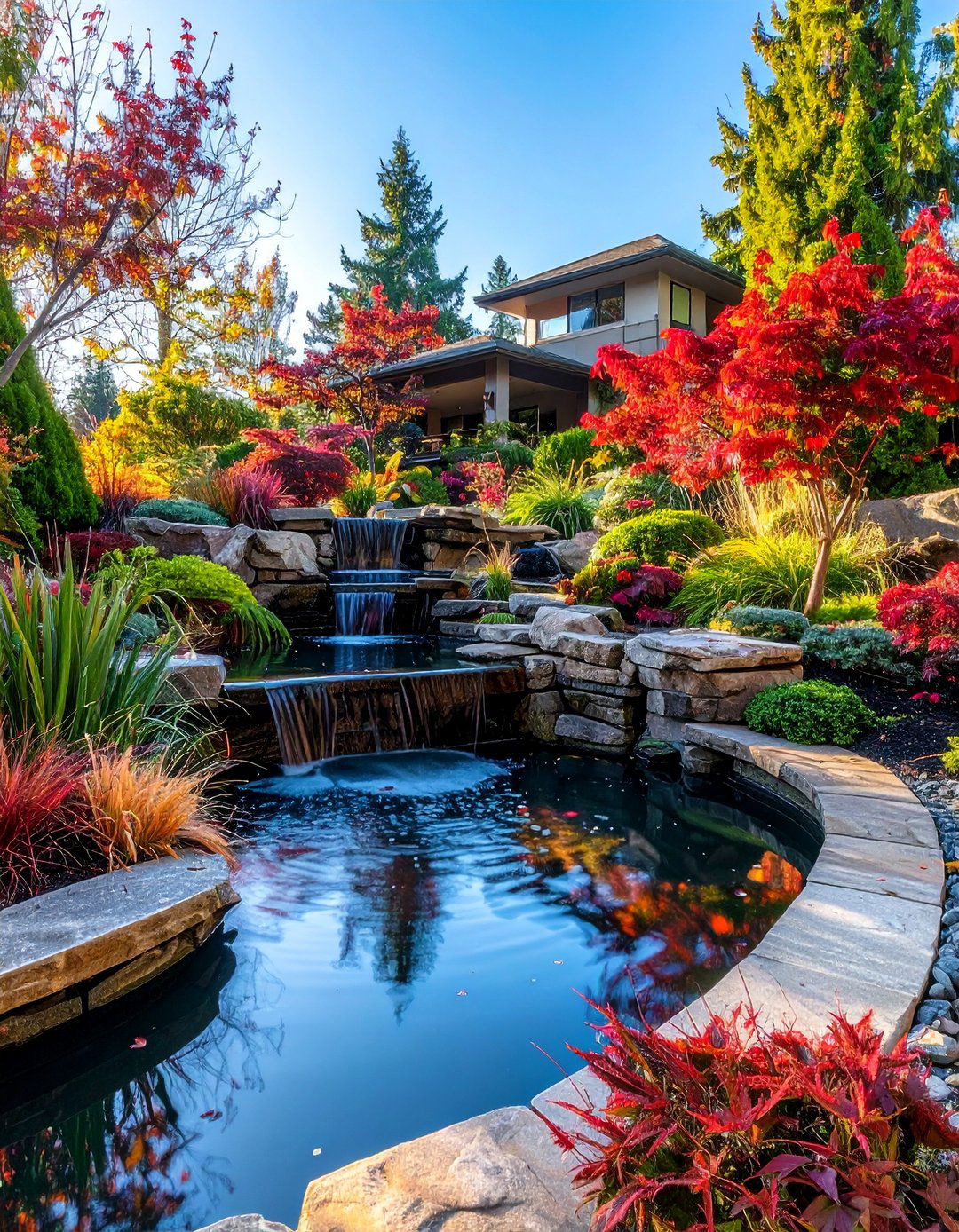
Create visual drama and soothing sounds with interconnected ponds at different elevations, where water flows from upper to lower levels through streams or waterfalls. This design maximizes the impact of water movement while creating multiple viewing areas and planting opportunities throughout the landscape. Each level can have its own character, from a formal upper pool to a naturalistic lower pond surrounded by bog plants. Can you envision the peaceful journey water takes as it travels through your garden landscape? The upper pond might feature a fountain or sculpture, while middle levels could house different types of aquatic plants, and the lowest pool could support fish. This system requires careful planning of pump sizing and water circulation, but the results create an impressive water feature that becomes the centerpiece of any yard. Surrounding pathways and viewing areas at each level invite exploration and provide multiple perspectives of the overall design.
8. Formal Reflecting Pool Design
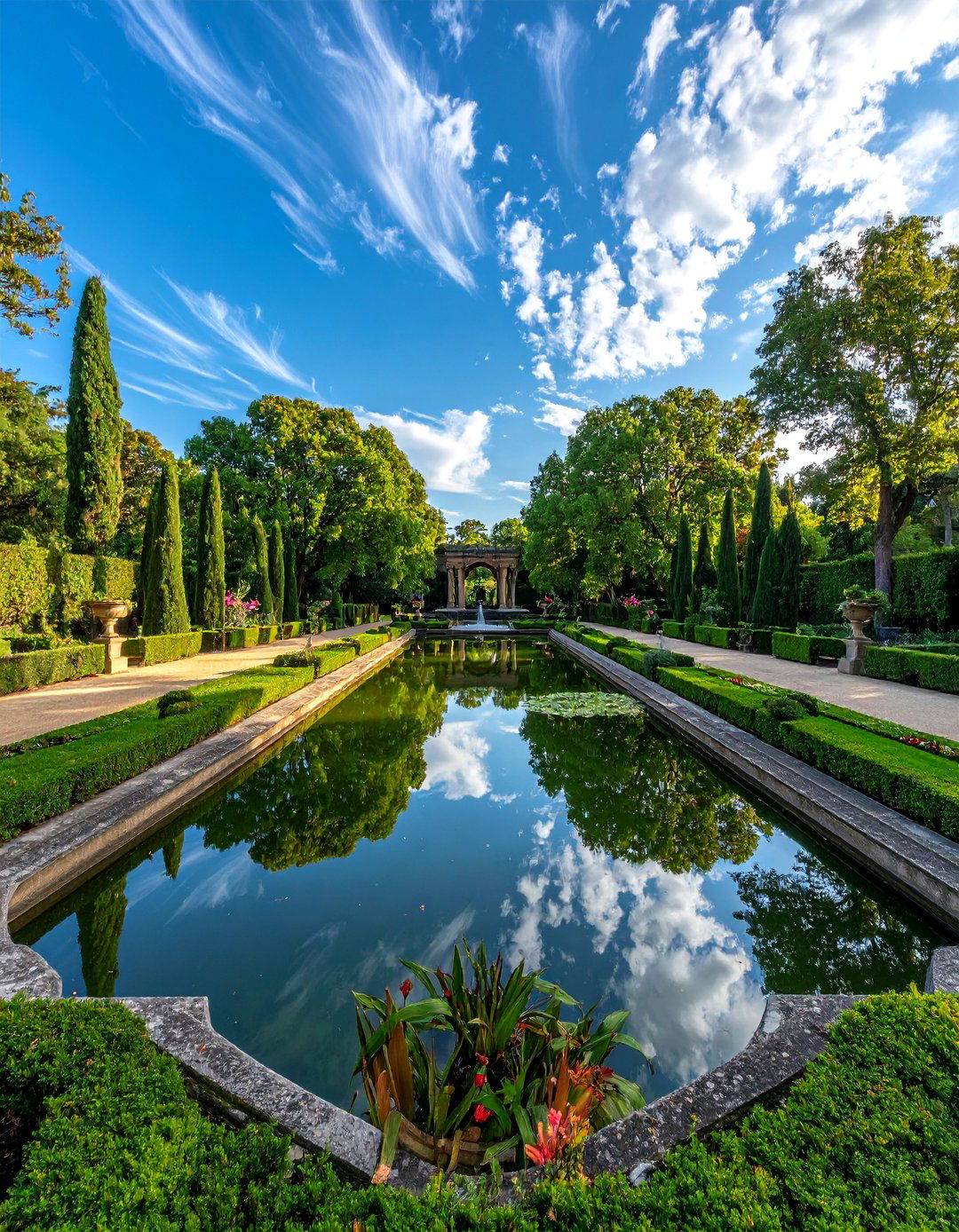
Embrace classical elegance with a formal reflecting pool that serves as a mirror for sky, clouds, and surrounding architecture or plantings. This sophisticated design emphasizes still water surfaces, geometric shapes, and symmetrical layouts that create a sense of order and tranquility. The pool's primary purpose is reflection rather than active water movement, though subtle fountains or bubblers can prevent stagnation. How magnificent would it be to see your garden's beauty doubled in the mirror-like surface of still water? Surround the pool with carefully manicured plantings, classical sculptures, or architectural elements that deserve to be reflected and appreciated from multiple angles. The clean lines and formal geometry work particularly well near traditional homes or in structured garden rooms defined by hedges or walls. Evening lighting can transform the reflecting pool into a dramatic nighttime feature, with underwater lights creating magical illumination that extends the garden's beauty well after sunset.
9. Bog Garden Pond Integration
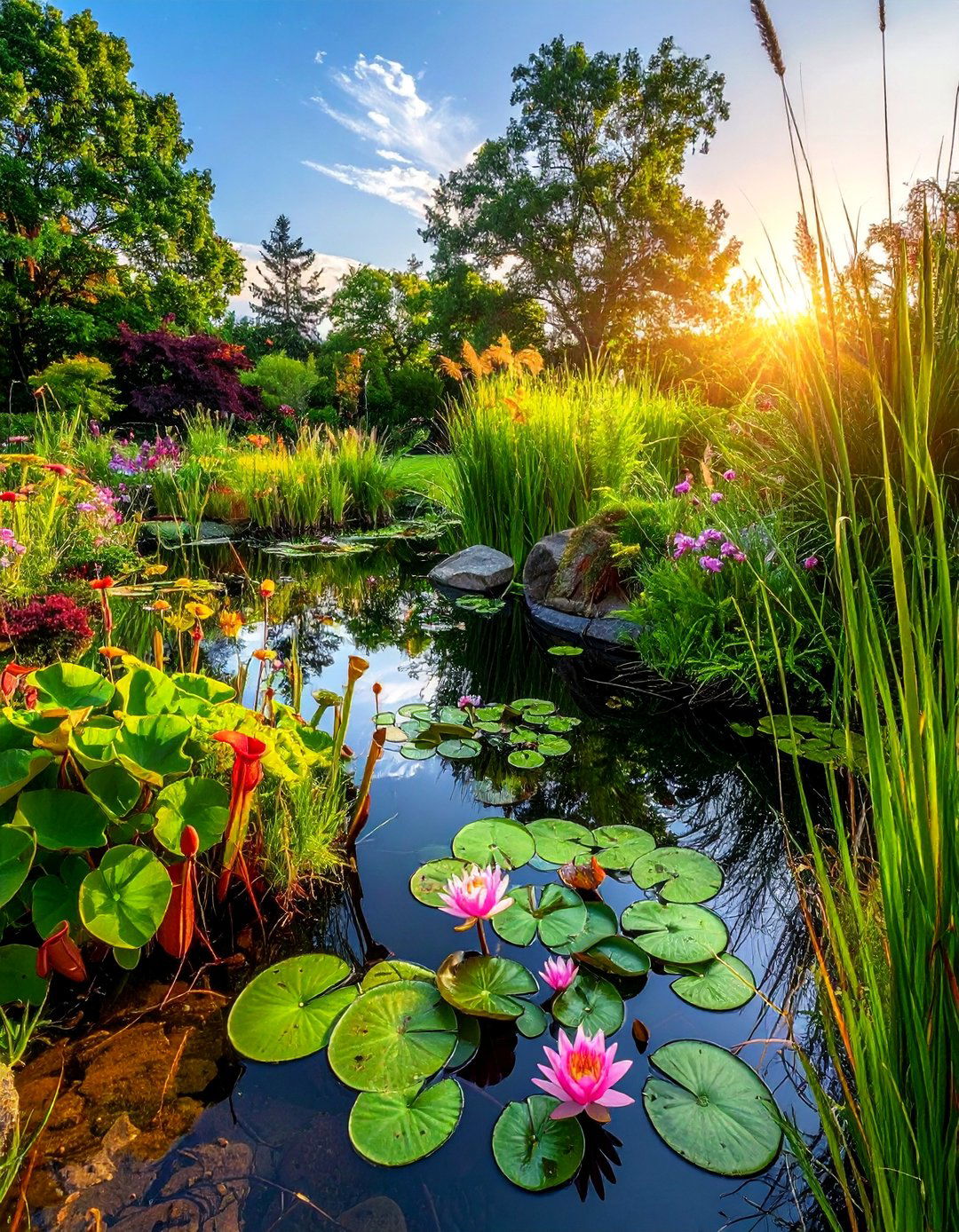
Combine the beauty of a pond with the unique appeal of bog plants by creating wetland areas that extend naturally from the water's edge. This design approach creates smooth transitions between aquatic and terrestrial environments while supporting plants that thrive in consistently moist soil. Bog areas can house spectacular plants like pitcher plants, lotus, and various sedges that add texture and seasonal interest. What fascinating carnivorous plants might you discover thriving in your own backyard wetland? Create these areas by extending pond liner beyond the water's edge and covering it with gravel and soil that remains saturated. The bog sections can be fed by overflow from the main pond or separate water circulation systems. This approach significantly increases the pond's ecological value while creating year-round interest through diverse plant materials. The design works particularly well for gardeners interested in unique plants and natural ecosystems, offering opportunities to grow species rarely seen in typical landscapes.
10. Island Pond With Decorative Bridge
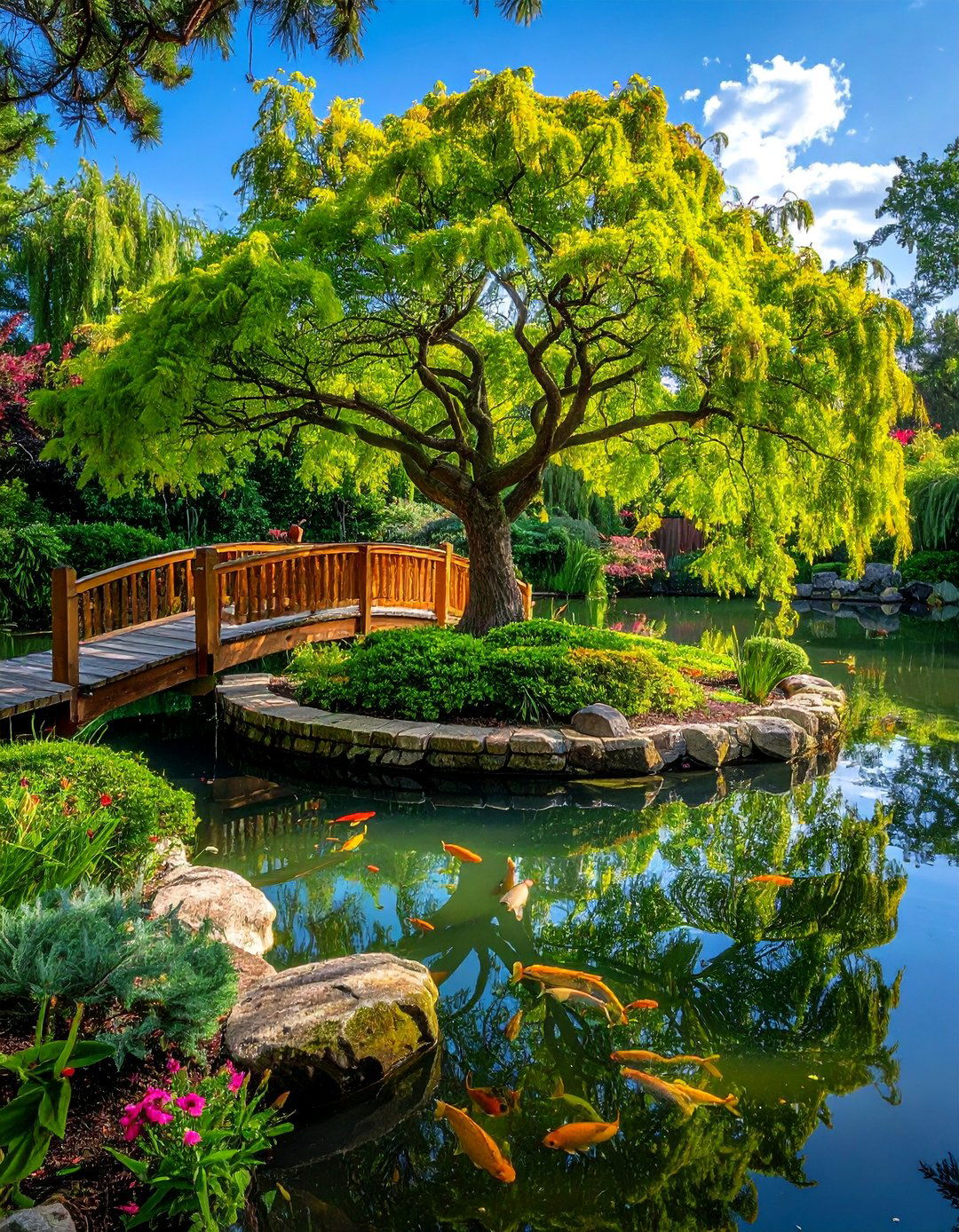
Create a sense of adventure and discovery by designing a pond with a central island accessible via a decorative bridge or stepping stones. This design adds vertical interest to the water feature while creating a special destination within the garden. The island can house a specimen tree, sculpture, or small garden that becomes a focal point visible from multiple viewpoints around the pond. Don't you think a charming bridge would make every walk through your garden feel like a special journey? The bridge itself becomes an important design element, whether constructed from rustic wood, elegant stone, or modern materials that complement your home's style. Position the island to create interesting sight lines and to break up large expanses of open water. This design encourages exploration and provides opportunities for creative landscaping on a small scale. The bridge also serves as an excellent vantage point for viewing fish, photographing the garden, or simply enjoying quiet moments surrounded by water.
11. Mediterranean-Style Fountain Pond
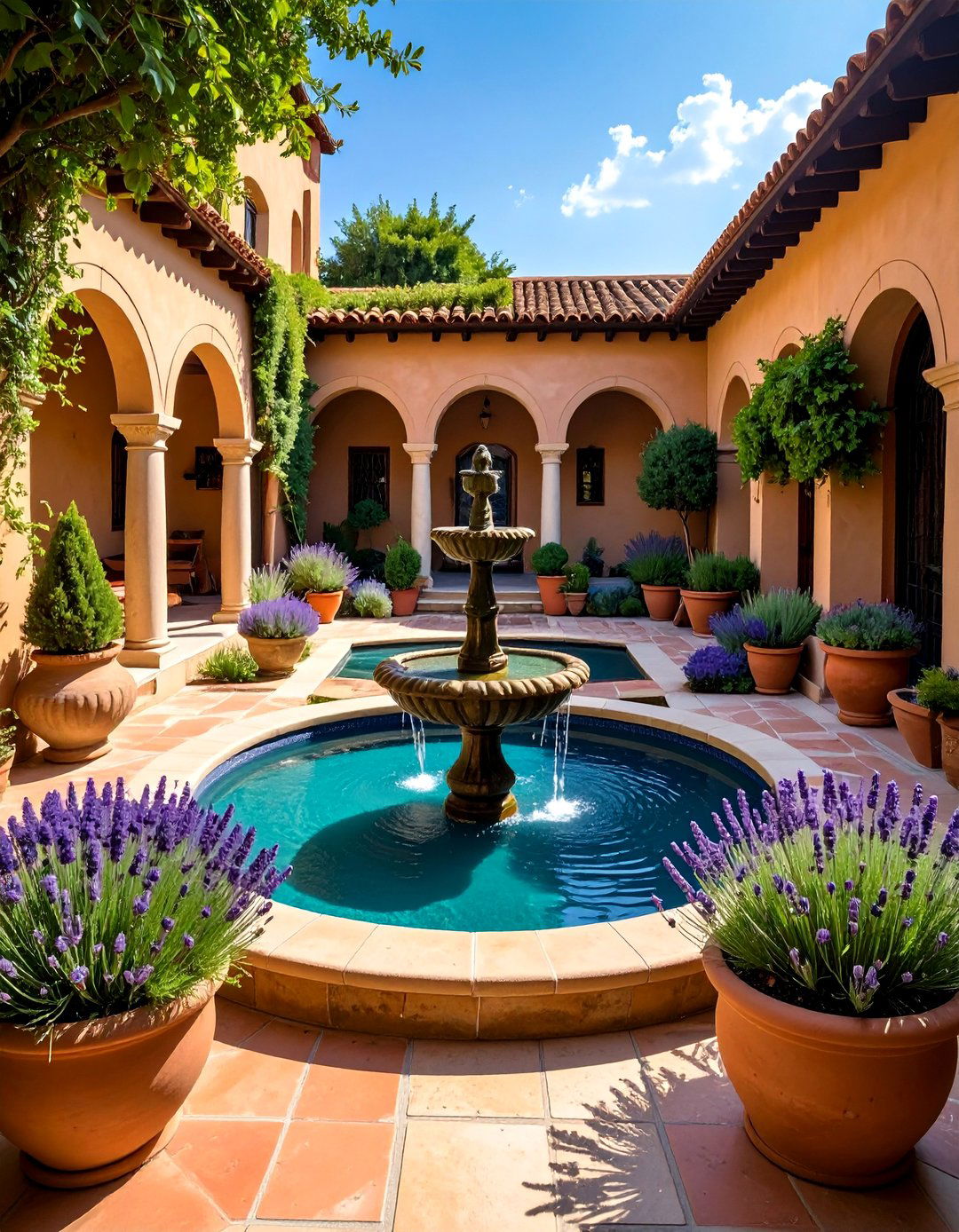
Bring the romance of European gardens to your backyard with a Mediterranean-inspired pond featuring classical fountains, terra cotta elements, and drought-tolerant plantings. This style emphasizes warm materials like natural stone, aged brick, and ceramic tiles that complement formal water features. Central fountains or wall-mounted spouts create the gentle sound of flowing water while adding sculptural interest to the design. Can you imagine relaxing in your own Mediterranean courtyard while listening to the soothing sounds of flowing water? Surround the pond with aromatic herbs like lavender and rosemary, along with olive trees or other Mediterranean plants that thrive in sunny locations. Use warm-colored stones and tiles to create pathways and seating areas that invite leisurely enjoyment of the space. This design works particularly well in sunny, protected courtyards or formal garden rooms where the classical elements can be fully appreciated. Evening lighting enhances the romantic atmosphere and allows for extended enjoyment of this elegant water feature.
12. Tropical Paradise Pond Design
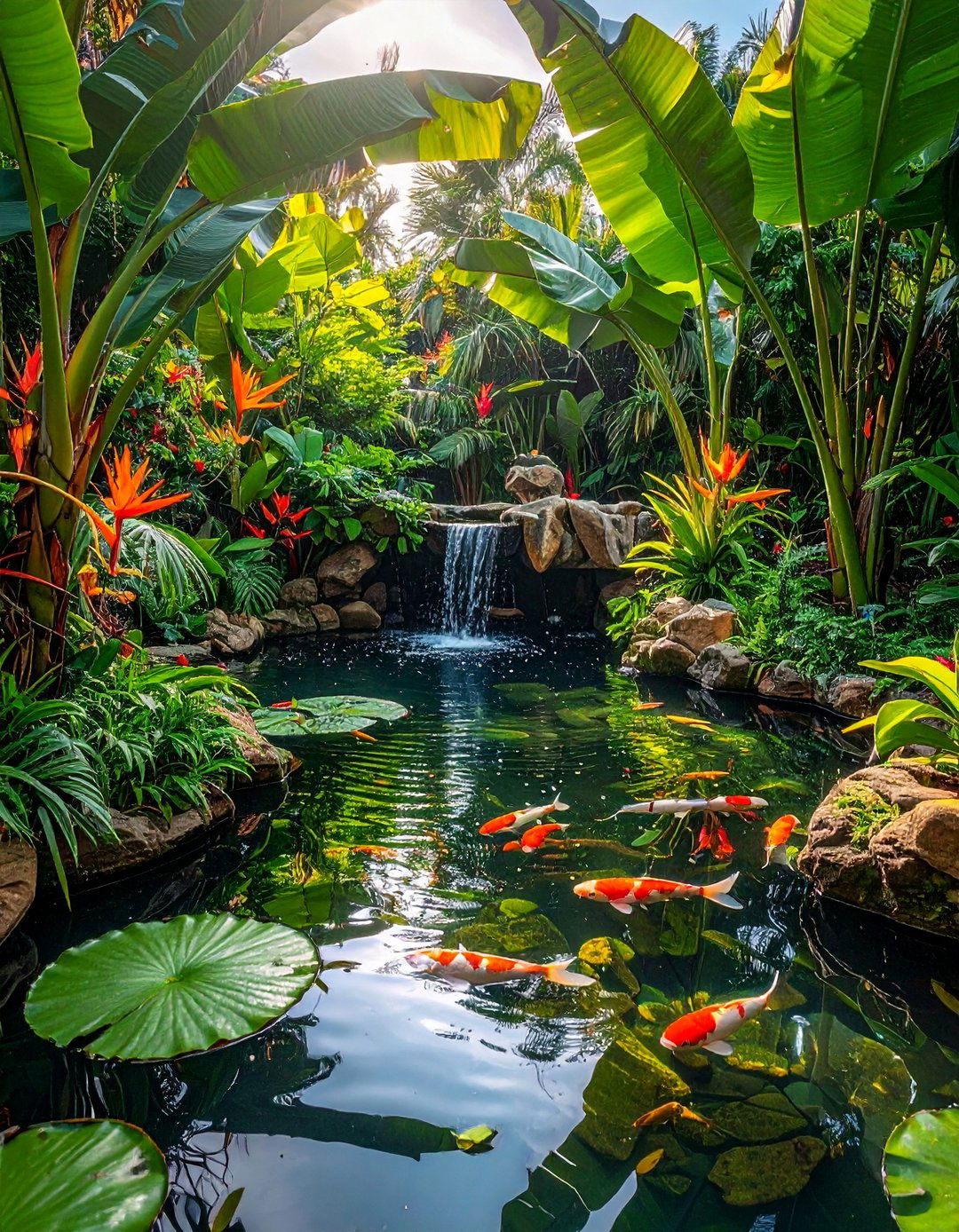
Transform your backyard into an exotic retreat with lush tropical plantings, colorful fish, and dramatic water features that evoke faraway destinations. This design emphasizes bold foliage, vibrant colors, and the sound of moving water to create an immersive tropical experience. Large-leafed plants like elephant ears and bird of paradise provide dramatic backdrops, while colorful koi or goldfish add movement and life. How incredible would it be to feel like you're vacationing in paradise every day in your own backyard? Include features like bamboo fountains, thatched umbrellas, or tiki torches to enhance the tropical theme. The pond itself can have irregular, natural curves that mimic lagoons, with shallow areas for wading birds and deeper sections for fish. Even in temperate climates, this design can work by using hardy plants that provide tropical appearance during growing season. Consider ways to protect tender plants during winter, or plan for seasonal changes that maintain the design's impact year-round.
13. Rock Garden Alpine Pond
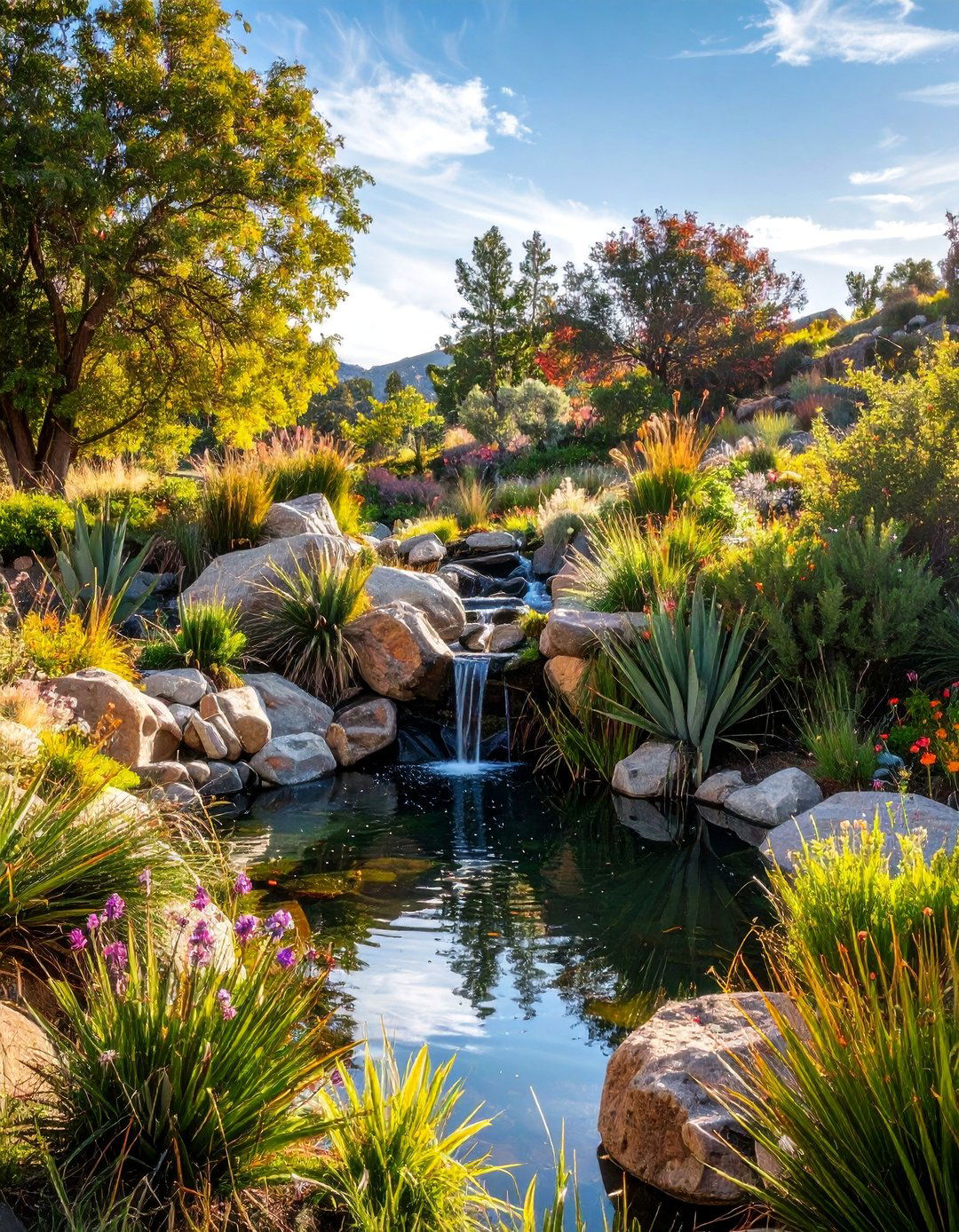
Create a mountain meadow feeling with a pond nestled among alpine rock gardens featuring drought-tolerant plants and naturalistic stone arrangements. This design works particularly well on sloped terrain where rocks can be arranged to appear naturally placed by geological forces over time. Small cascades and streams wind between rock outcroppings, creating intimate viewing areas and planting pockets. What better way to bring the serenity of mountain landscapes to your everyday environment? Choose plants that naturally occur in rocky environments, such as sedums, ornamental grasses, and alpine perennials that provide color without requiring rich soil or frequent watering. The pond itself should appear to be a natural mountain tarn, with crystal-clear water reflecting surrounding peaks of stone. This design requires careful attention to rock placement and drainage, but creates a low-maintenance landscape that looks beautiful in all seasons. The combination of water and stone provides cooling effects during hot weather while requiring minimal irrigation.
14. Cottage Garden Pond Setting
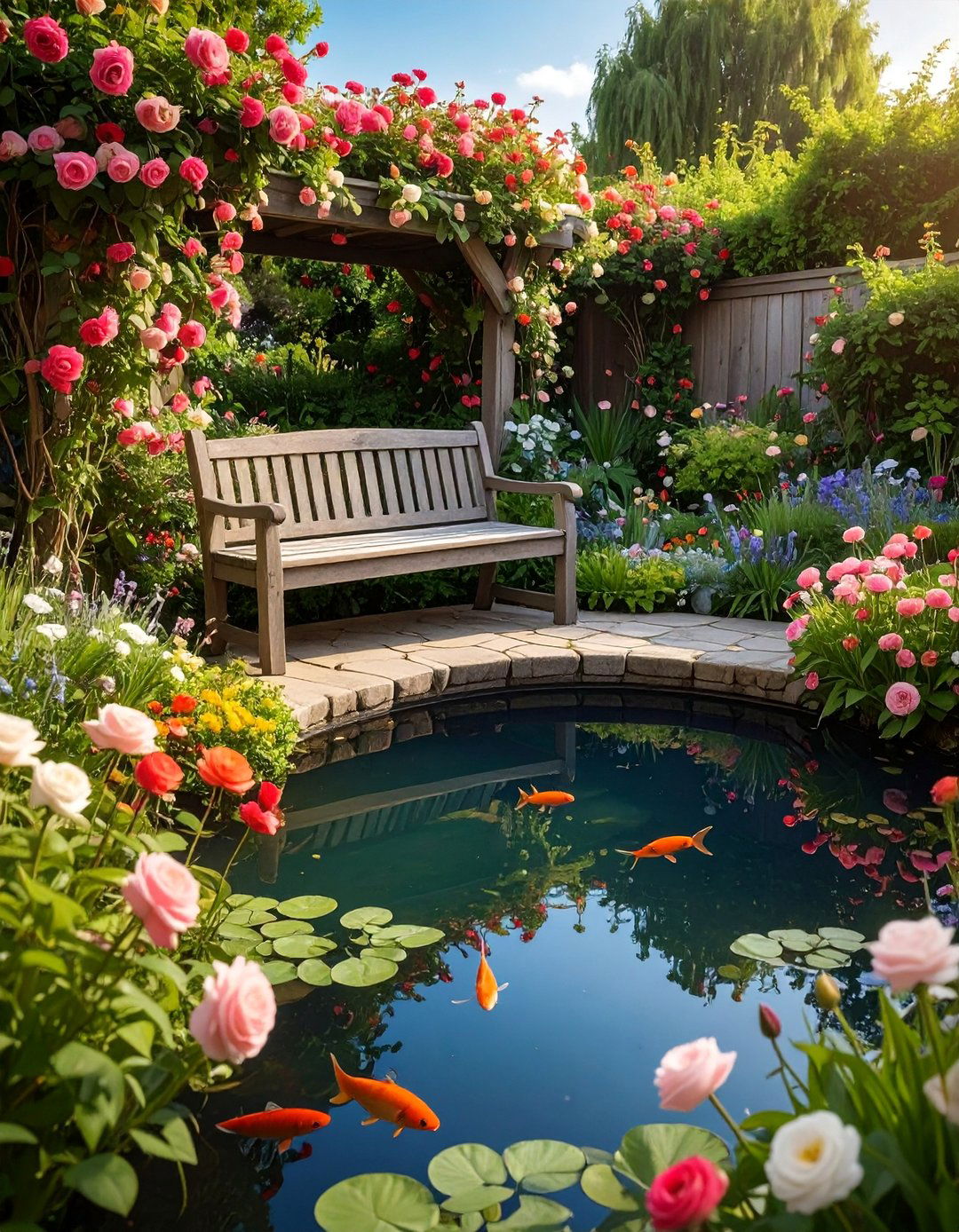
Integrate your pond seamlessly into a romantic cottage garden where informal plantings, curved pathways, and vintage accessories create a charming, lived-in atmosphere. This style emphasizes abundant flowering plants, casual design, and the feeling that the garden has evolved naturally over time. The pond becomes a focal point surrounded by billowing perennials, climbing roses, and self-seeding annuals that soften hard edges. Can you picture yourself picking flowers for bouquets while goldfish swim lazily in the background? Include features like weathered wooden benches, vintage containers used as planters, and perhaps a small dock or platform for feeding fish. The overall effect should feel romantic and slightly overgrown, with plants spilling over pathways and water edges. This design celebrates the beauty of controlled chaos and seasonal change, creating a garden that feels welcoming and comfortable rather than formal or intimidating.
15. Seasonal Display Pond Garden
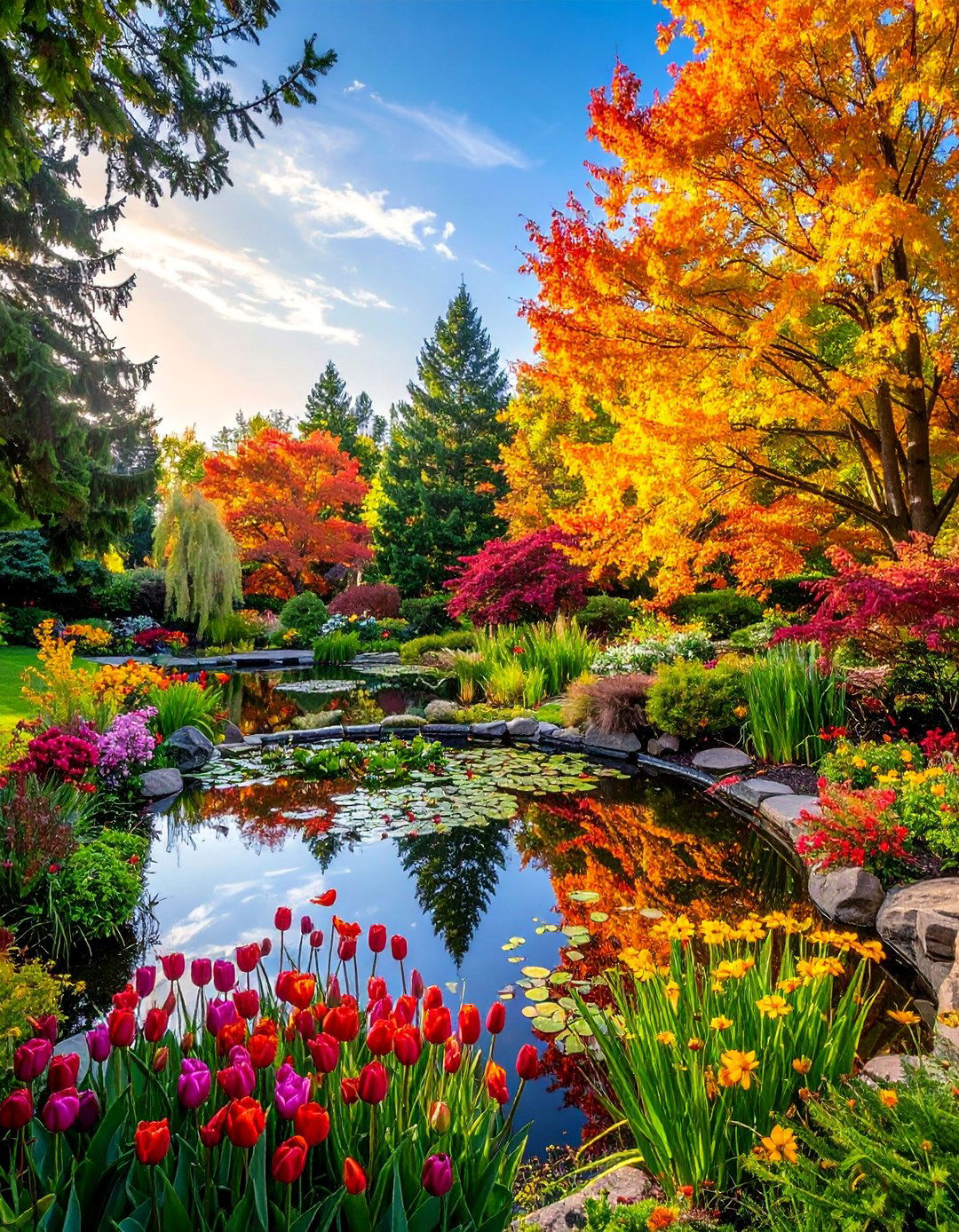
Design your pond to provide year-round interest by incorporating plants and features that shine in different seasons, creating an ever-changing landscape that rewards careful observation. Spring bulbs emerge around pond edges, summer brings peak flowering of aquatic plants, autumn provides spectacular foliage color, and winter reveals attractive bark and evergreen structure. How exciting would it be to discover something new and beautiful in your garden every month of the year? Plan plant combinations that ensure continuous interest, from early crocuses pushing through snow to late-blooming asters attracting butterflies in fall. Include evergreen elements like conifers or bamboo to maintain structure during dormant seasons. Consider how different lighting conditions throughout the year affect the pond's appearance, and plan viewing areas that take advantage of seasonal highlights. This approach rewards gardeners who enjoy detailed planning and observation, creating a landscape that deepens in meaning and beauty over time as its rhythms become familiar.
Conclusion:
Creating your perfect pond landscape involves balancing practical considerations with aesthetic dreams to achieve a water feature that enhances your outdoor living experience. Whether you choose a simple container garden for a small patio or an elaborate multi-level system for a large yard, the key is selecting elements that work together harmoniously. Consider your maintenance preferences, available space, local climate, and personal style when making decisions about materials, plants, and features. Remember that the most successful pond designs create peaceful spaces that invite regular use and enjoyment rather than becoming maintenance burdens. Start with a clear vision of how you want to use and experience your water feature, then build upon that foundation with carefully chosen elements that support your goals and bring lasting satisfaction to your outdoor sanctuary.

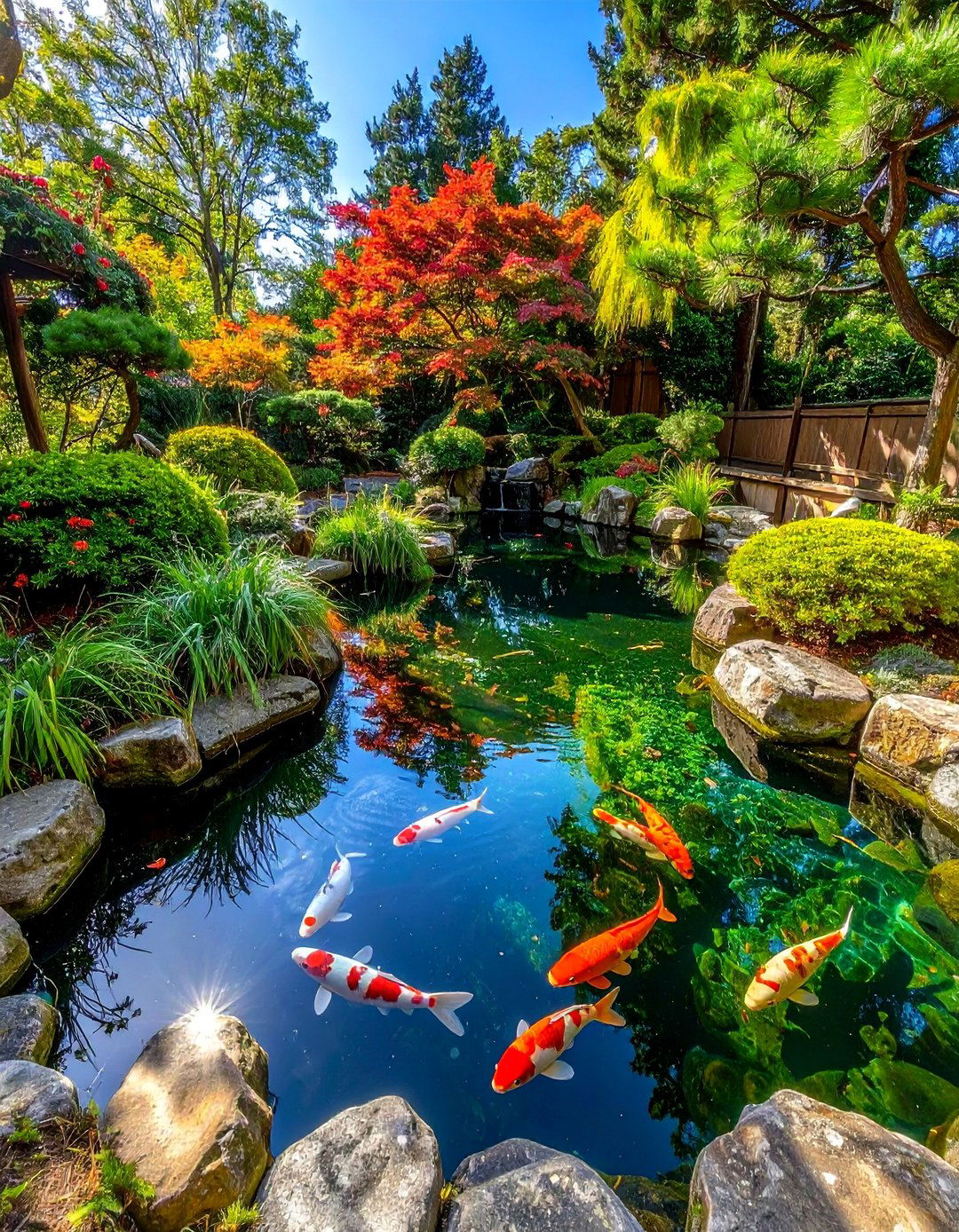
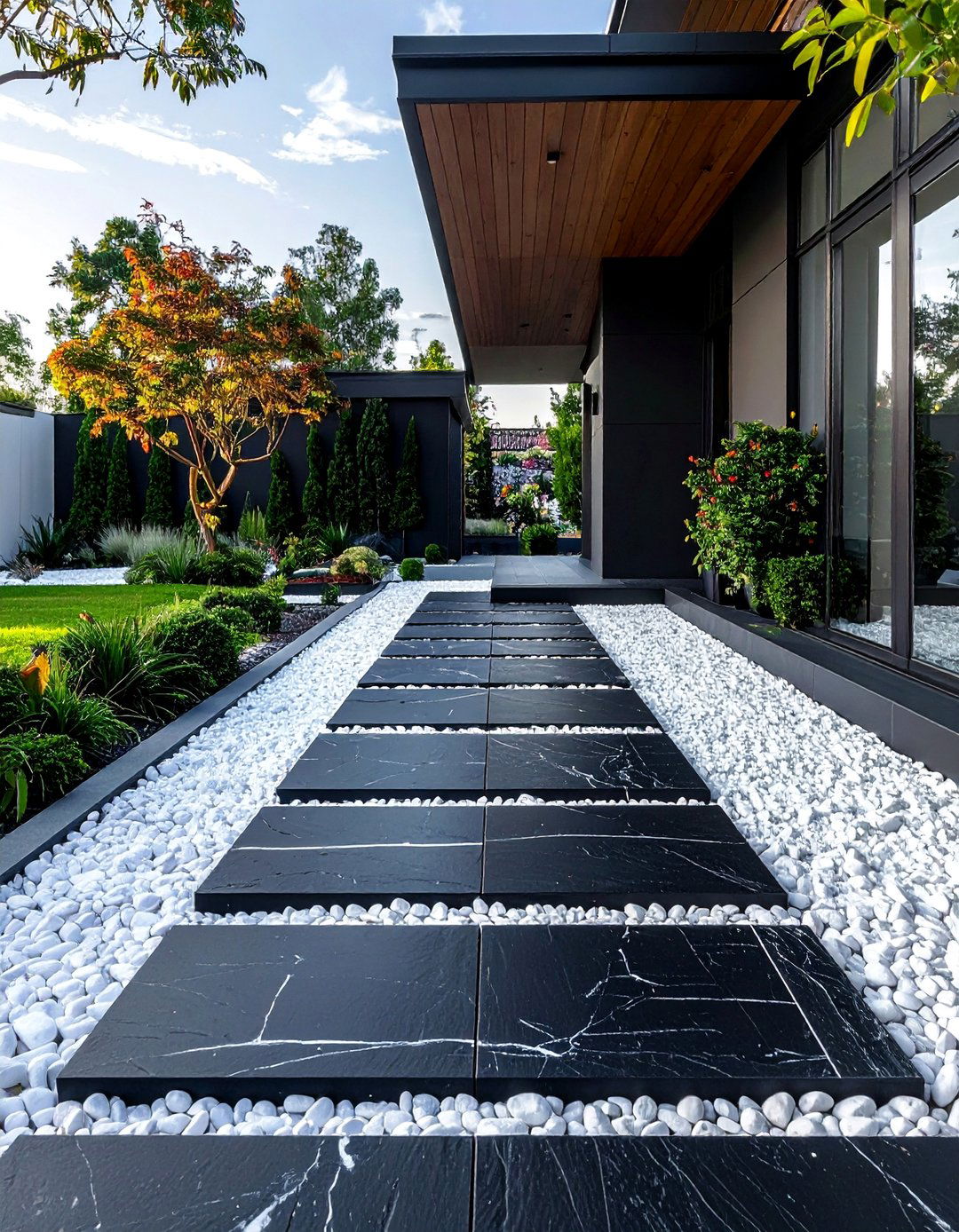
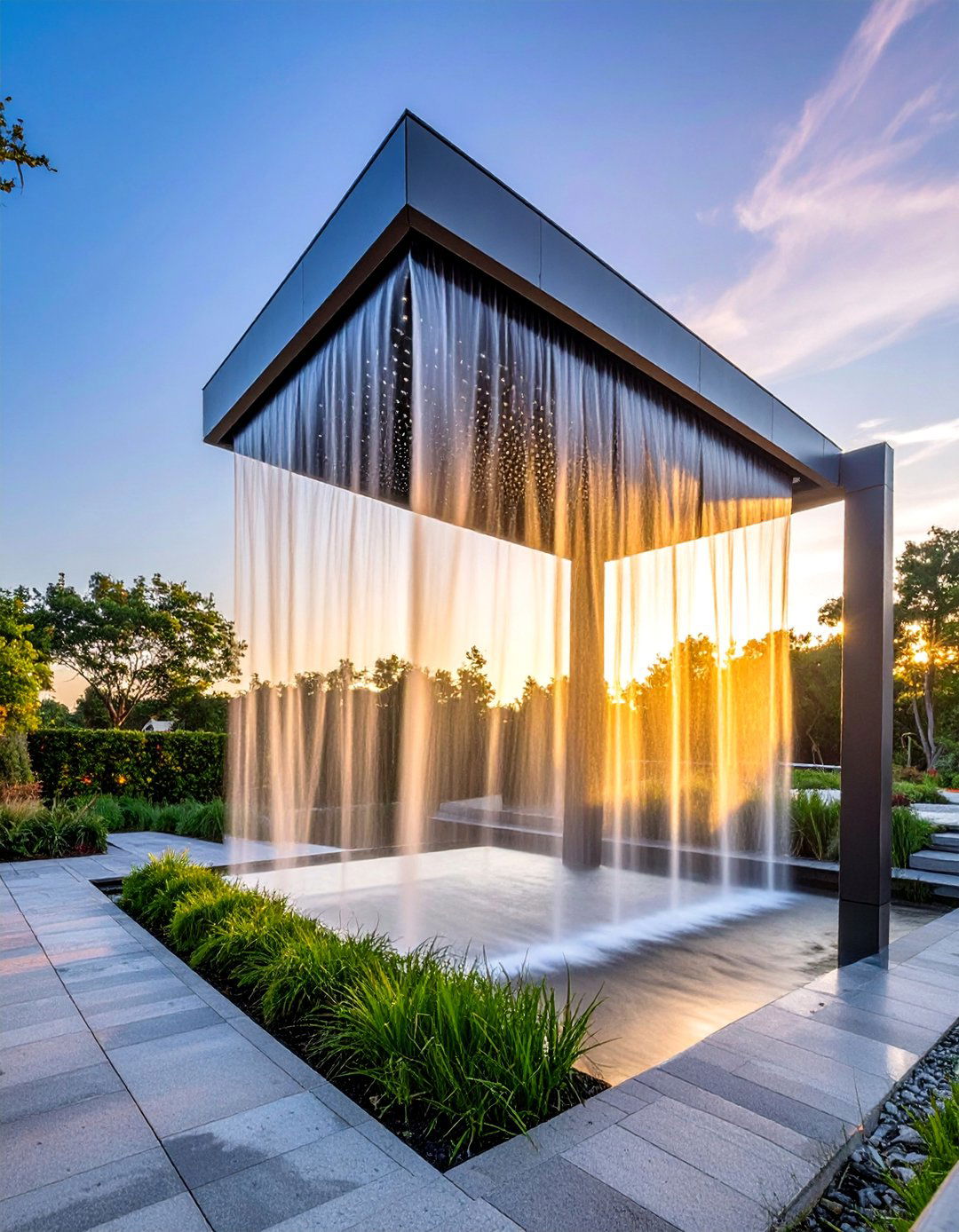
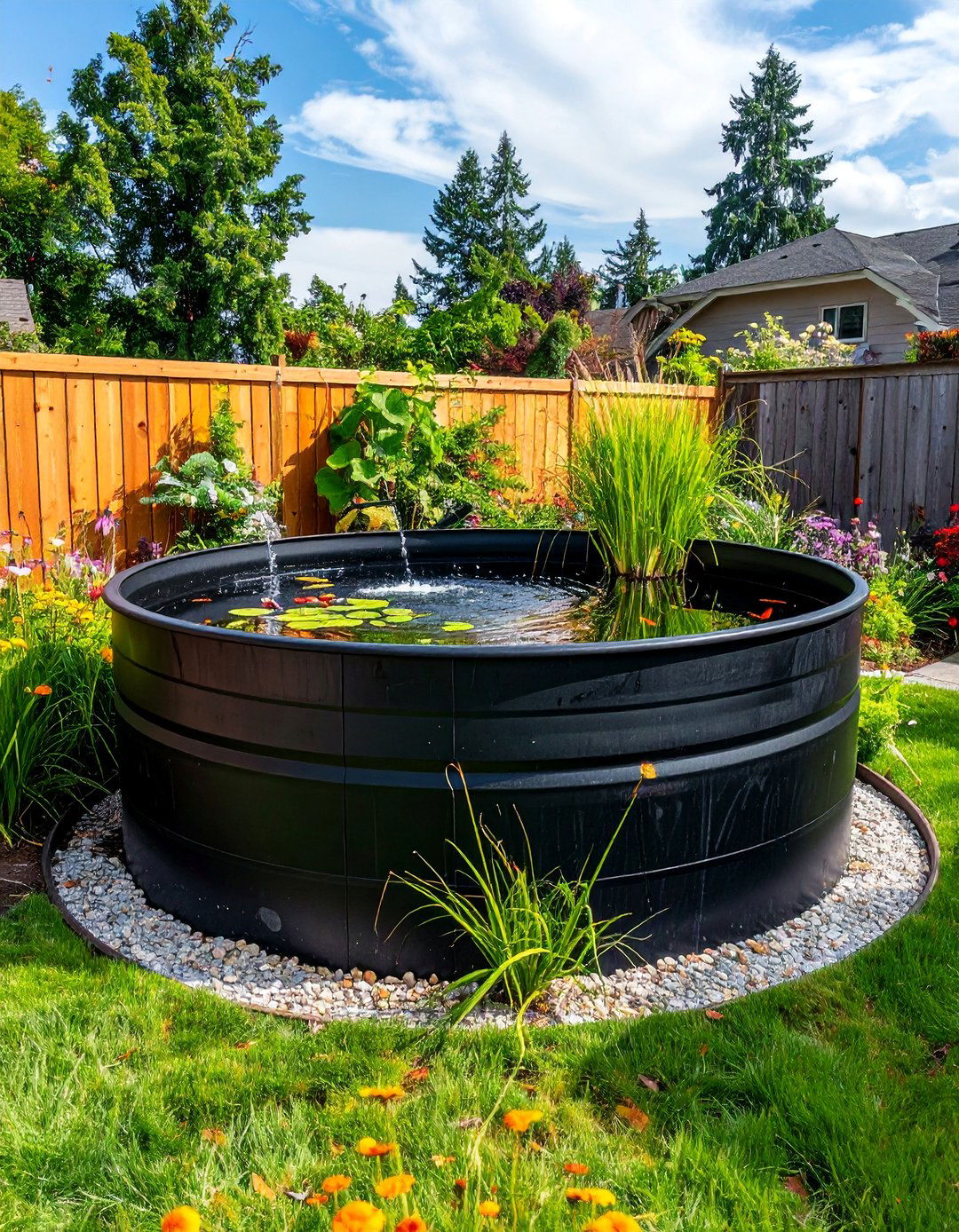
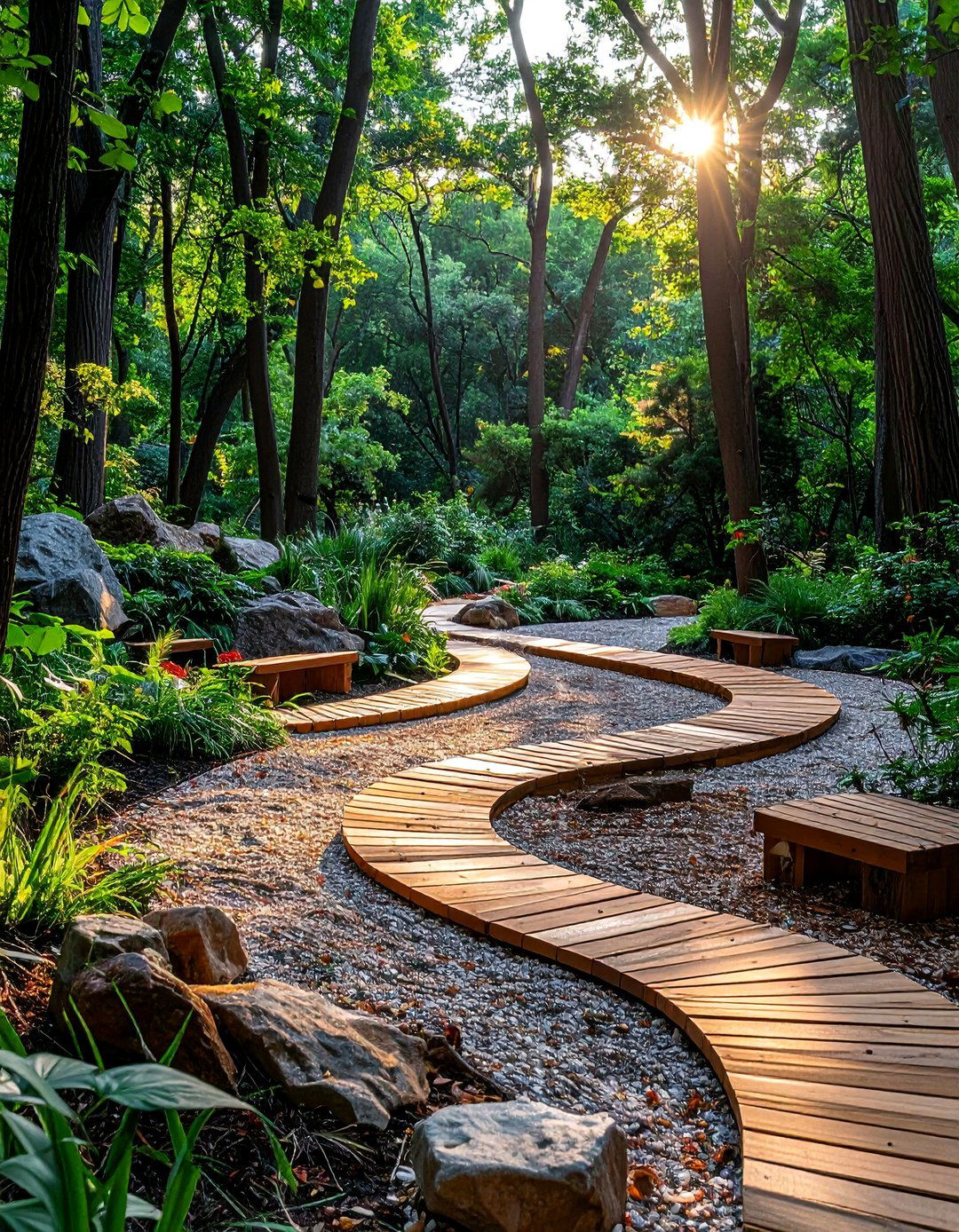
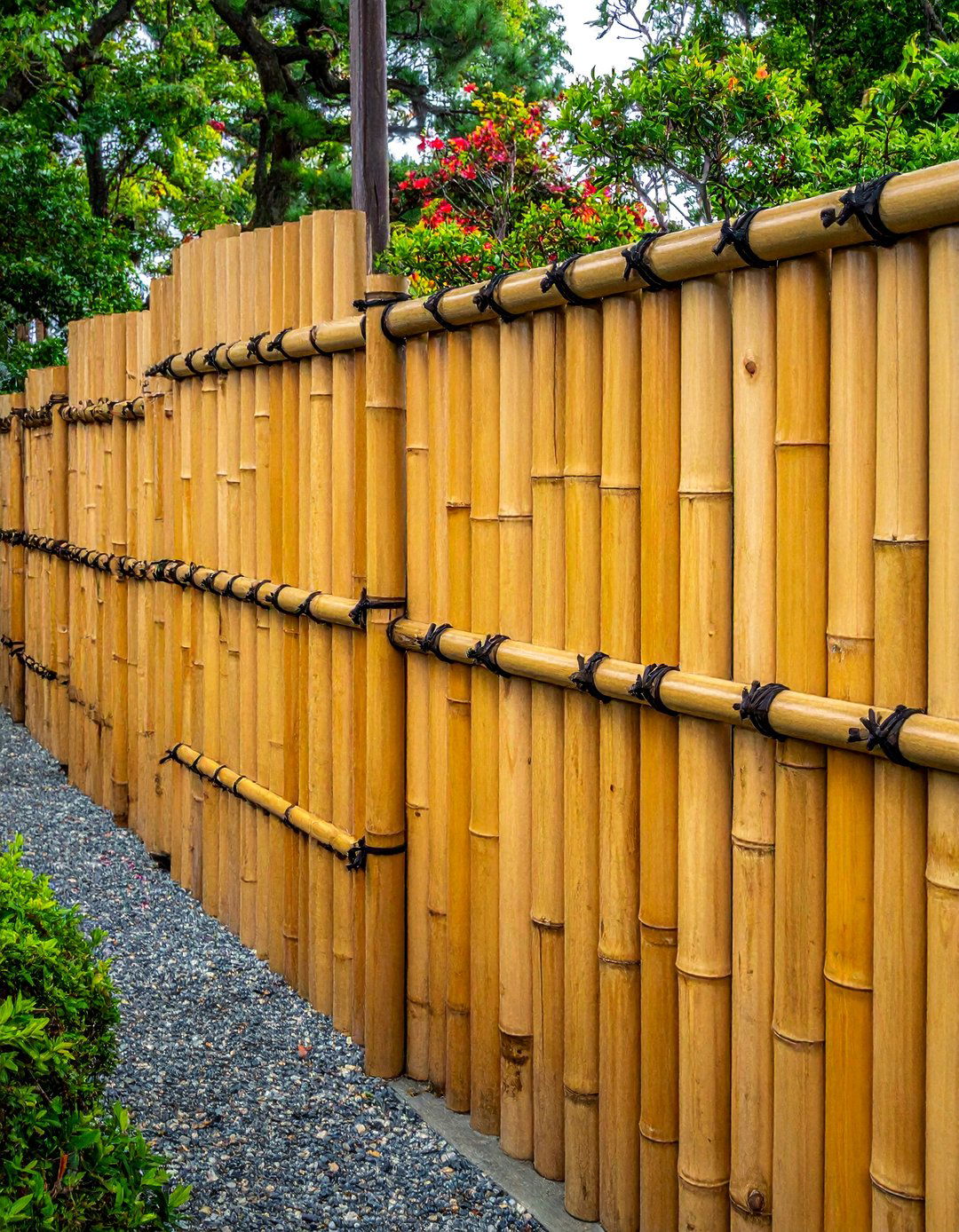
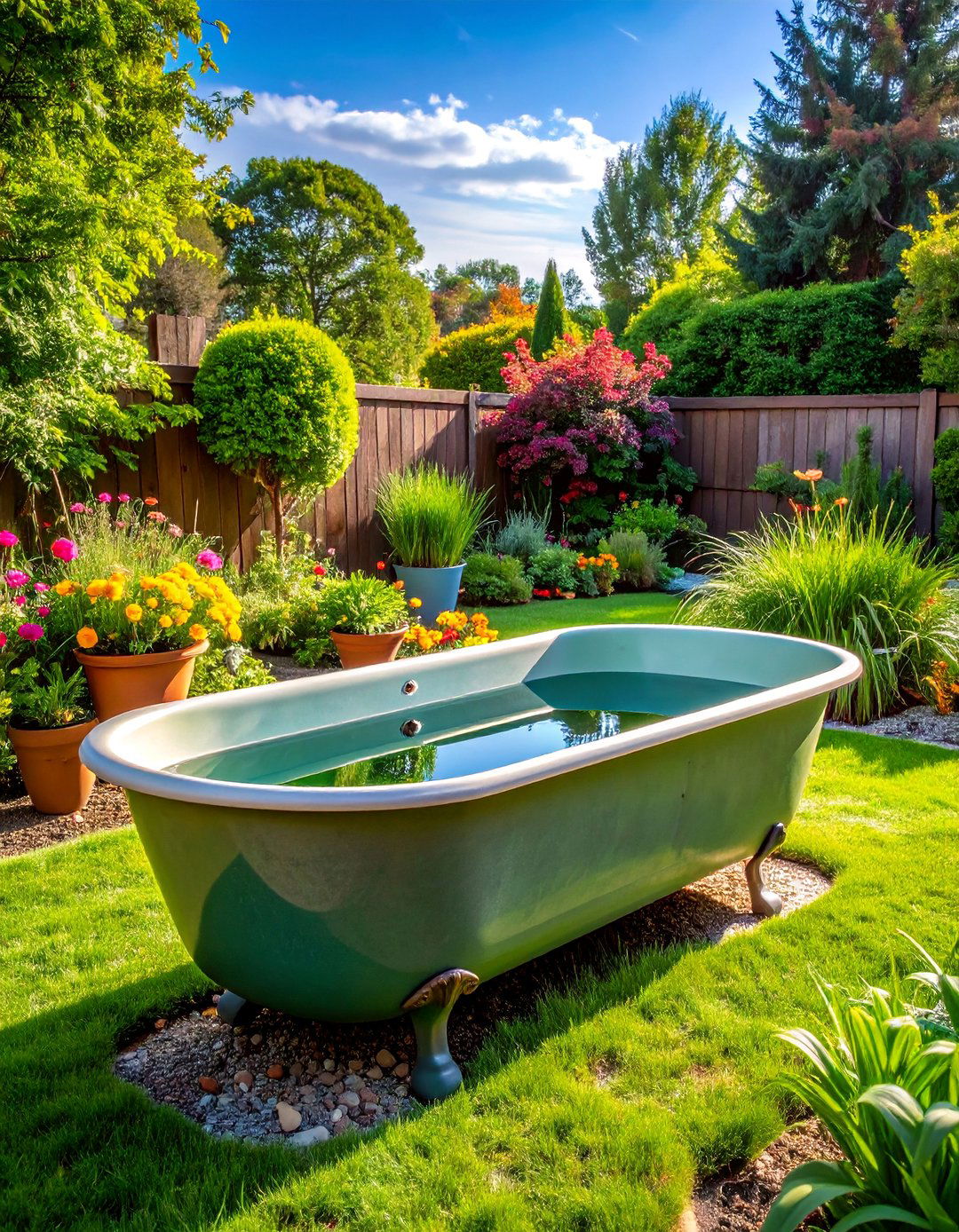
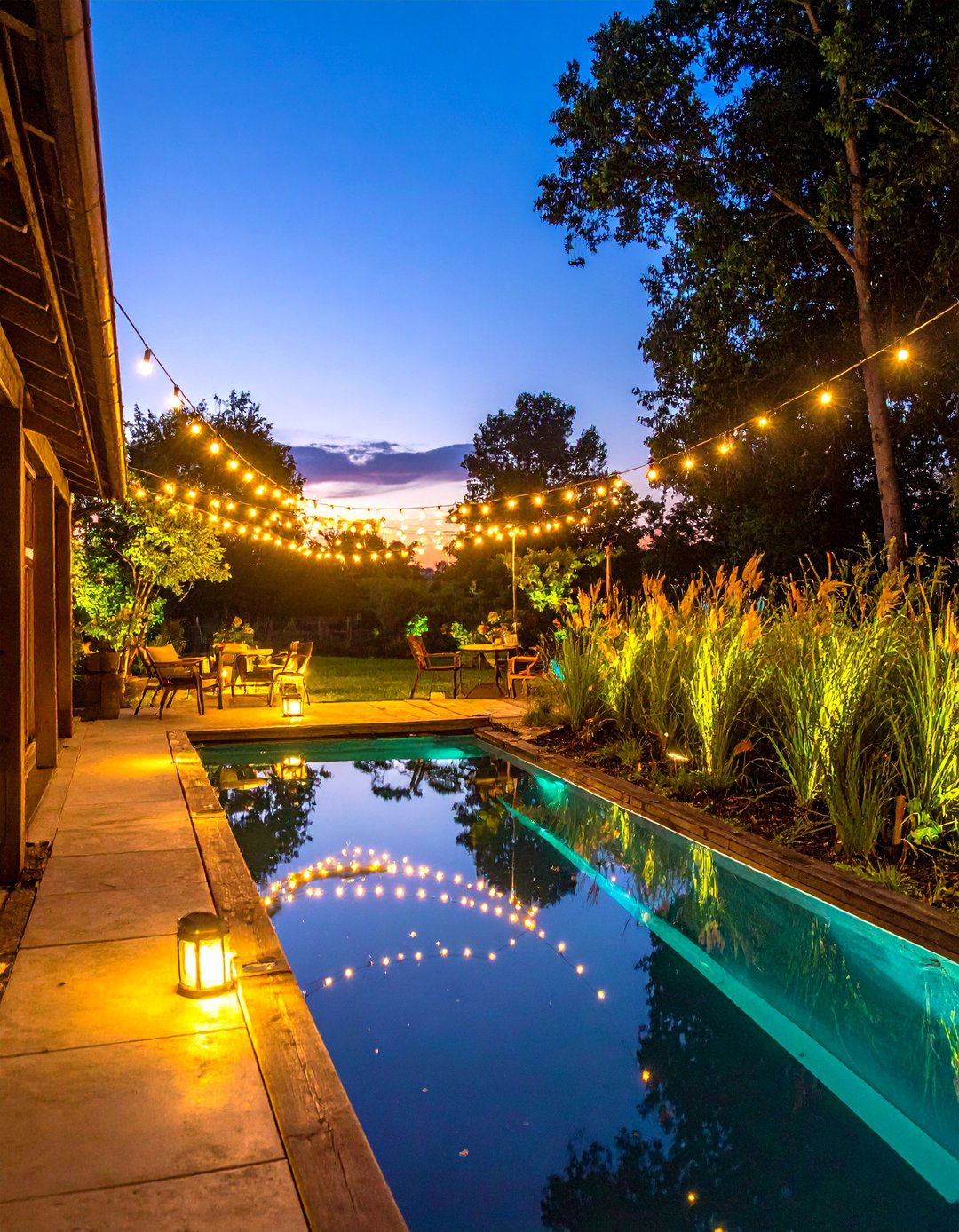
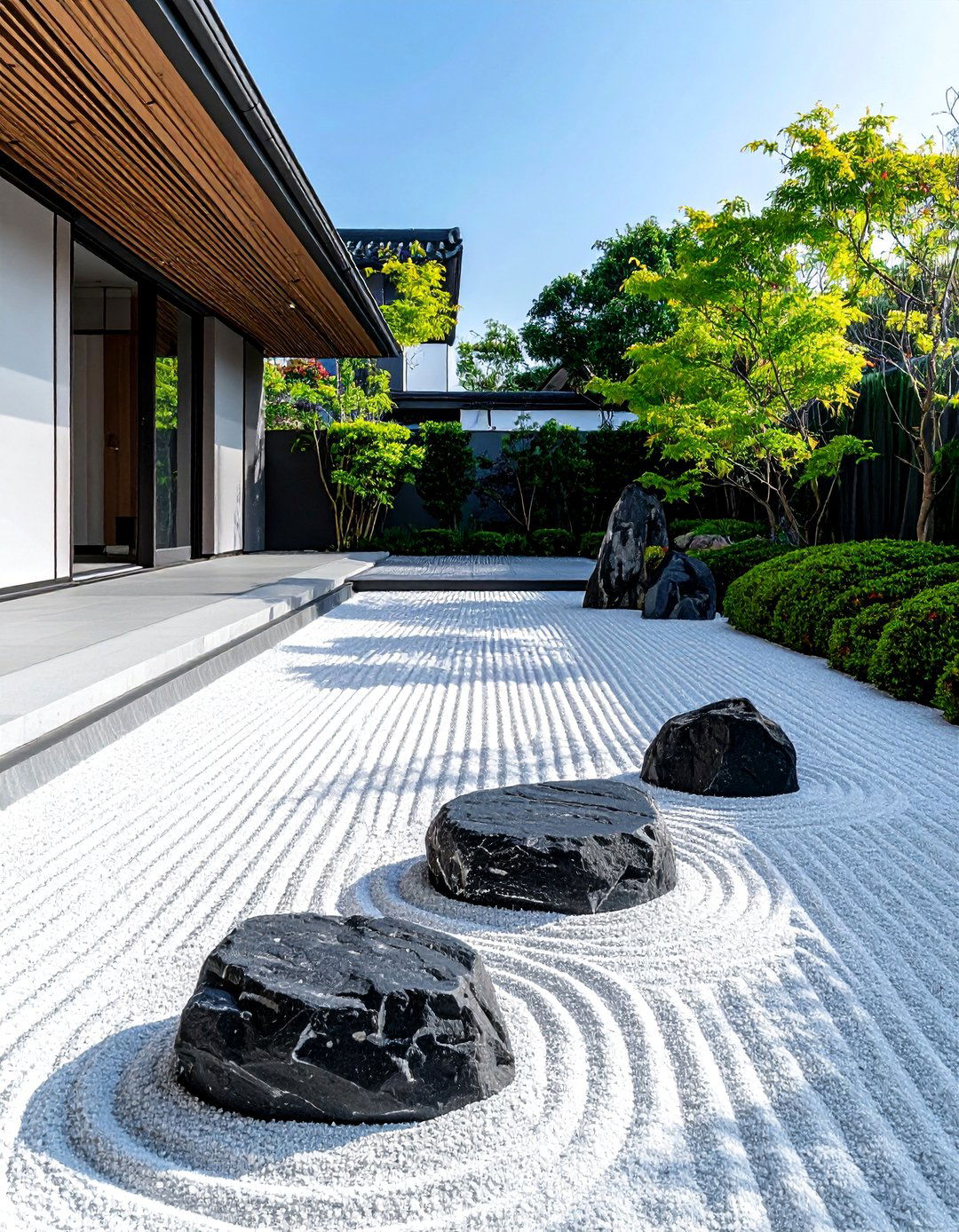
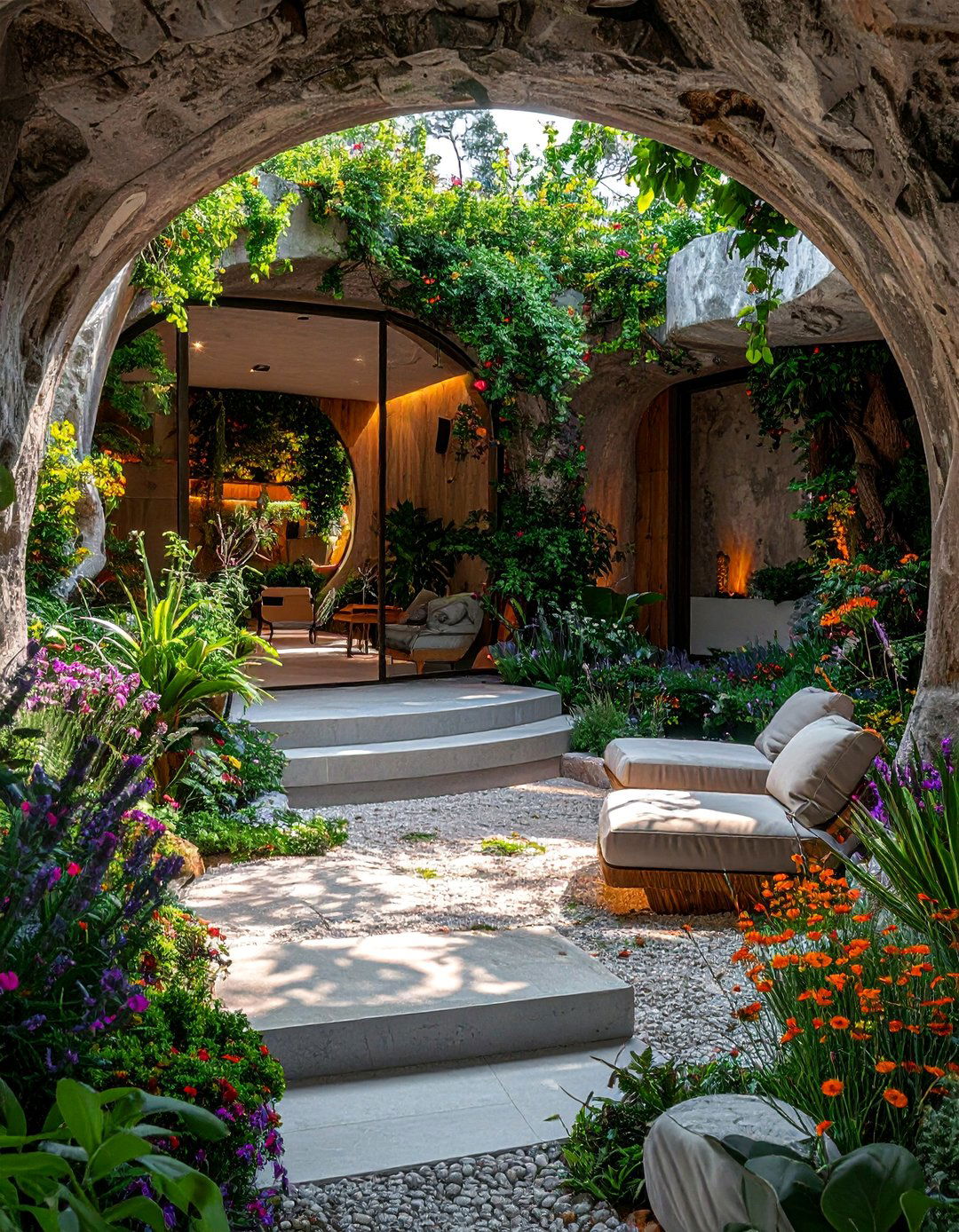
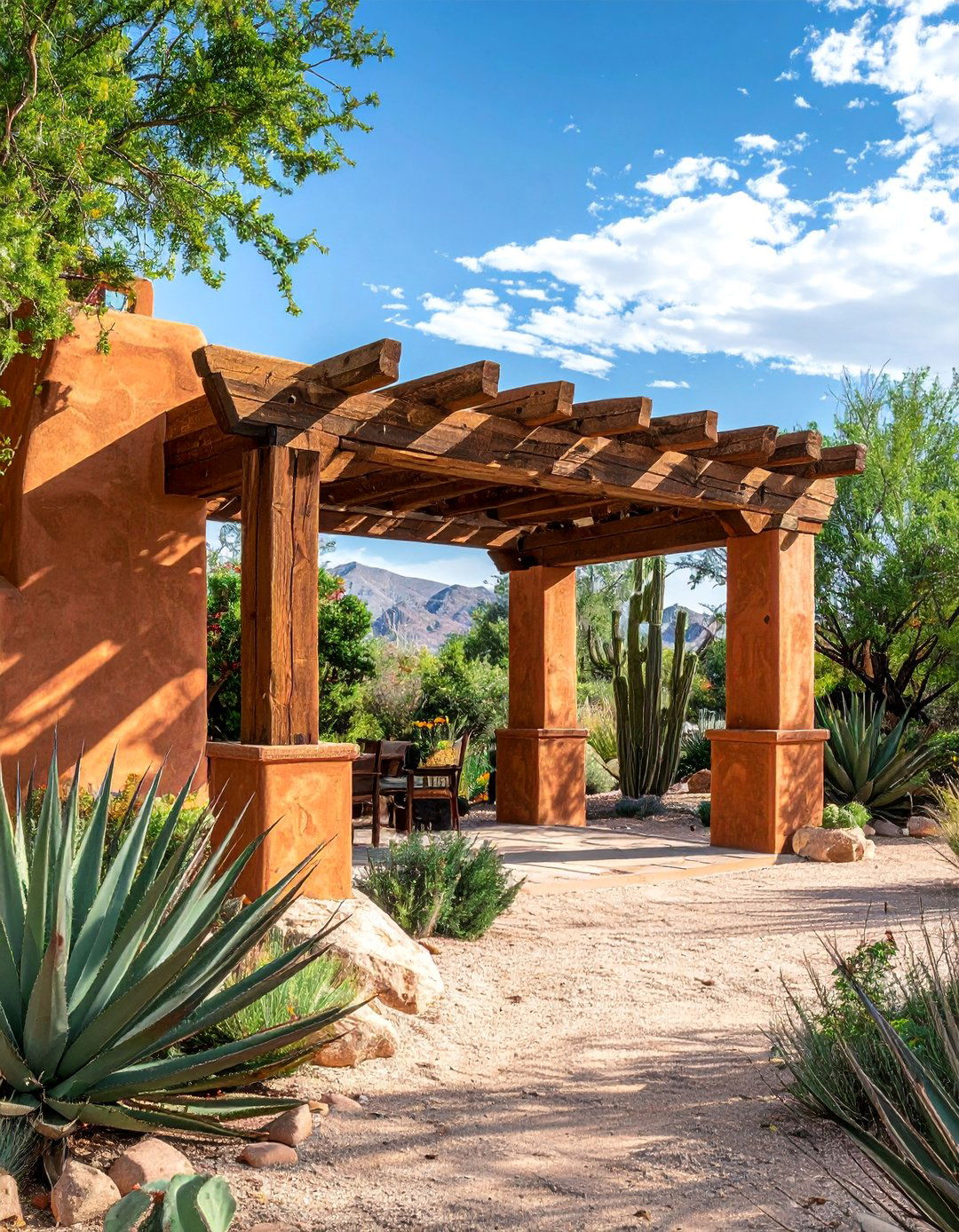
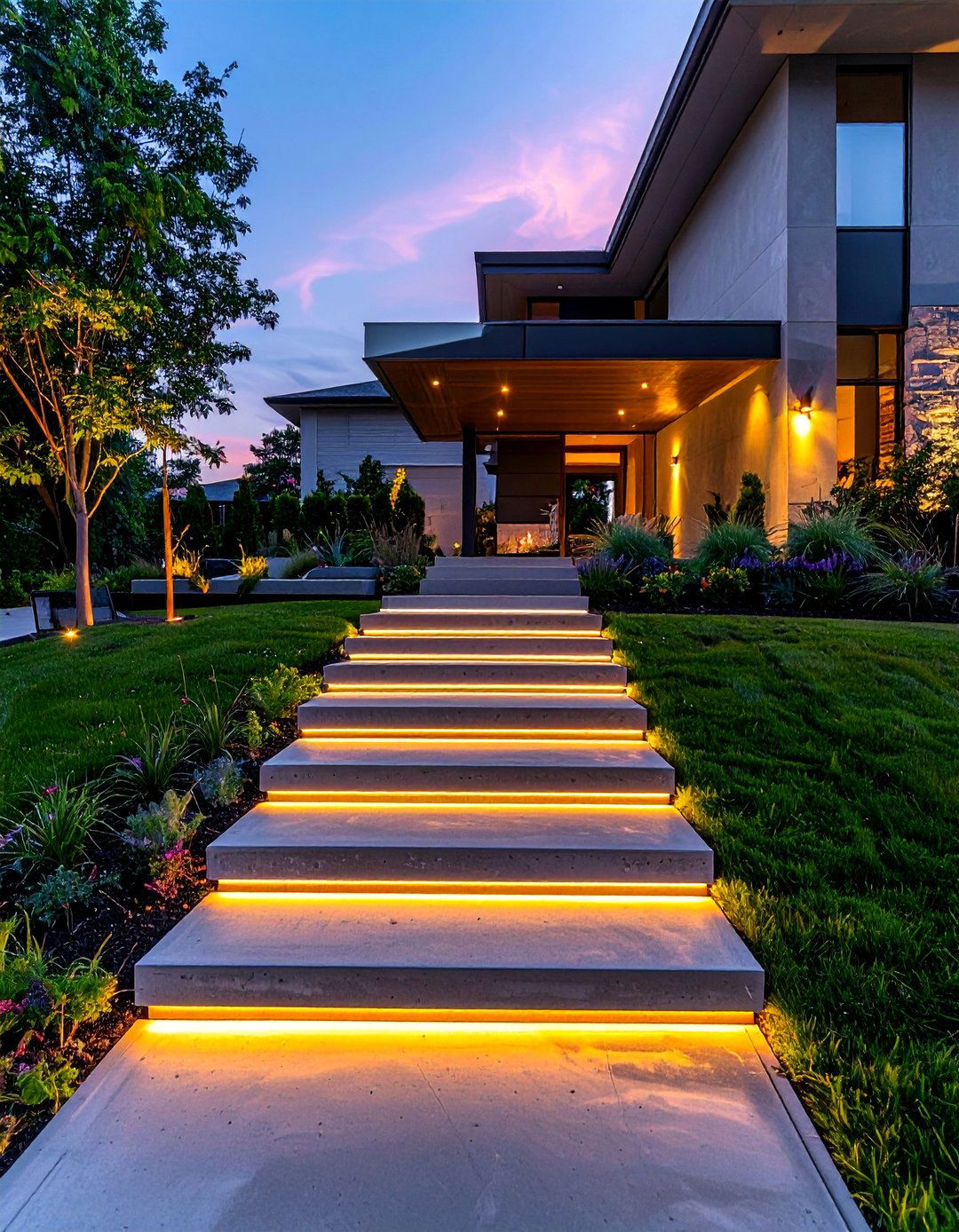
Leave a Reply